.

, .
, , .
Does School Prepare Us for Life? (According to Education Experts)
School has always been seen as the stepping stone to the real world, meant to teach us life’s lessons and prepare us for any challenges that come our way. But is that really true?
Does school prepare us adequately for the demands of real-world responsibilities, or does it only provide a limited view of what lies beyond its doors?
To shed light on this matter, experts weigh their opinion on whether or not school really prepares us for life.
Iqbal Ahmad

Founder and CEO, Britannia School of Academics
I firmly believe that education does indeed prepare us for life
For many students, going to school is an essential aspect of life. It helps us prepare for experiences in the future by putting us through countless hours of challenging exercises and experiences in the classroom.
Many people have stated that kids are becoming more and more prepared for the later stages of their lives as a result of multiple technological advancements and a huge increase in the options available in today’s education.
In contrast, others think that a school’s monotonous routine limits students from discovering their inner selves. These pupils are never instructed to pursue their gifts, even though some may have had the aptitude to become a pianist or have a passion for the arts.
Instead, they are required to adhere to a curriculum; if they do not, they are told that they will fail in life. Is that so? Are you doomed to failure if you don’t succeed in school? Are all the folks who did well in school and received straight A’s leading prosperous lives?
Let’s look at a few of the many things school teaches us, which help us throughout our lives. The school days are crammed with information, covering everything from English to Mathematics. All of these involve teaching, memorization, comprehension, and testing of the students.
In addition to grades and exams, the school offers a broader curriculum that includes character development, citizenship training, and personality development.
I firmly believe that education does indeed prepare us for life.
Self-discipline
The first lesson we learn at school is self-discipline . We develop the ability to follow directions and stick to a schedule. We also develop a sense of respect for time and punctuality.
In addition, we are taught how to plan and use our time efficiently. We also follow and respect laws and guidelines. Disciplined children will become disciplined adults and succeed in their future endeavors.
School strengthens our determination and perseverance
Additionally, the school strengthens our determination and perseverance.
We develop the ability to meet school requirements. We learn to adhere to deadlines and turn in our homework on time. We also gain the ability to handle pressure and stress.
Students learn how to overcome challenges in school. Character-rich students will be better equipped to handle future obstacles in their careers and personal lives.
Confidence and teamwork
Co-curricular activities are an integral element of a student’s life. They aid in shaping kids’ personalities and characters so that they develop confidence. They aid in developing the kids’ leadership abilities. Students get the ability to collaborate and support one another. They also pick up on positive principles.
Students gain the ability to put forth their best effort, participate productively, and accept both success and failure with grace. As students, we learn the values of fair play and good sportsmanship.
Additionally, co-curricular activities teach kids commitment, loyalty, and responsibility. When they are older, they will be dedicated to meaningful work and working effectively in teams.
Social interaction and diversity
The school is a little community. Regular social interaction is a great way to get ready for life in the outside world. Students have the chance to connect with classmates from other backgrounds, creeds, and races while they are in school.
They develop tolerance, acceptance, and understanding. The pupils can collaborate and socialize with one another while working, and it supports togetherness and encourage an open mind.
Now, let’s have a look at how school doesn’t prepare us for real and practical life.
Students who lack skills are unable to function in modern society
It is fair to argue that recent high school graduates lack any skill set. Therefore, they are unable to function in modern society.
If they learned anything throughout their high school years, it was from the part-time jobs they took on to supplement their income. Otherwise, the school makes no effort to teach the children the necessary abilities.
This is because there is nothing in those school texts that teaches students how to apply their theoretical learning in the real world!
After graduating from college, students’ core issue is a lack of understanding of how money functions.
You won’t learn how to handle, save, or make money through investments in any of your classes. Even after doing well in their math and financial courses, many students struggle with managing their funds.
Ashley Shannon

Education Specialist, Satchel Pulse
Majority don’t believe schools are truly preparing students for life after education
Did you know that the average US student spends around 1,260 hours a year in school? Given that there are 12 years of obligatory formal education, the amount of time a student would have spent in school by the age of 18 is colossal.
For this reason (and many others), school is a crucial part of a child’s life, and every child deserves to get as much value out of their education as possible.
Related: Why Do Schools Exist?
In addition to the academic value, such as learning math or a foreign language, by the end of 12th grade, students should feel that their time spent in school has holistically prepared them for their next steps in life. But is our current education system achieving this?
What do studies show? A major aspect of life for most people is the world of work, and according to many employers, this is an area for which most students leaving our education system are not fully prepared.
In 2021, the Econotimes published that two out of five employers believe school and college graduates are unprepared for employment.
Similarly, 22% of students say that they are “not at all” prepared for future employment, while only 5% of people in the US believe high school graduates are prepared for work.
These statistics show that the overwhelming majority do not believe schools are truly preparing students for life after education.
SEL gets young learners future-ready
These low percentages don’t just point to a skill deficiency in academics and work experience but rather a holistic view of a student’s career readiness.
In a separate study , employers were asked which skills they deemed to be vital for young learners to gain so that they could thrive in the working world.
79% of the skills ranked as the top priority for these employers are classed as social-emotional skills, such as communication abilities, ethics, punctuality, honesty , and teamwork (Cunnigham & Villaseñor, 2016).
When asked about the most prominent skill gaps they’ve experienced when hiring, 42% of the skills mentioned are also classed as social-emotional.
These results are clear indications that in order for schools to prepare students for life truly, they must understand the importance of Social-Emotional Learning (SEL). SEL is one of the most effective ways to get young learners future-ready and prepared for whichever direction they go in throughout their lives.
When children begin developing SEL skills from a young age, by the time they reach adulthood, they are more likely to have the following:
- Stronger self-management
- Self-awareness
- Responsible decision-making
- Social awareness
- Relationship skills
These abilities have been outlined by CASEL (the Collaborative for Academic, Social, and Emotional Learning) as not only an integral part of a student’s academic journey but also their human development.
Subsequently, when schools are not making efforts to nurture these critical skills in young learners, they’re also not truly preparing them for life.
Matthew Spaur

Director of Marketing, EQuip Our Kids!
School prepares us for life, of course
At school, we learn literacy and numeracy skills, science and history, plus, if we’re lucky, some health and arts as well. We also learn about friendship and social status and peer pressure and bullying and struggle, and disappointment. All those are part of life, too.
But better questions to ask would be:
- Does school prepare us for all of life?
- How well does school prepare us for life?
- How could school better prepare us for life?
School is not life
Because we are social creatures, most of our life, and most of our success in life, is not based on academics.
Our life consists of relationships — with ourselves, with our teachers, with our colleagues, with our families and neighbors, and with fellow citizens. Our ability to thrive in those relationships determines a large part of our life.
Relationships are especially true in the world of work, something for which school is supposed to prepare us. Daniel Goleman, the author of “ Emotional Intelligence: Why It Can Matter More Than IQ ,” found that 90 percent of career success comes from our emotional intelligence, not academic intelligence.
The National Network of Business and Industry Associations defines four categories of employability skills. Only one of those categories, Applied Knowledge, relates to academics.
The other three categories cover Personal Skills , People Skills , and Workplace Skills . These vital non-academic skills include:
- Decision making
- Problem-solving
- Conflict resolution
Even straight-A students need these skills in order to succeed in school and work, and life.
Schools can teach life
How can schools address all those non-academic personal, people, and workplace skills that help us succeed in the workplace and, incidentally, in the rest of life?
For decades, some schools have been including social-emotional learning, or SEL, in their curriculum. It’s a jargony name for the research-proven methods to teach the personal, people, and workplace skills we all need to thrive in school, work, and relationships.
Schools that fully implement SEL see incredible results:
- Greater academic achievement
- Lower disciplinary problems
- Higher test scores
- Graduation rates
Research also shows that young adults who have received SEL instruction experience:
- Less poverty
- Workplace conflict
These adults have higher rates of mental and physical wellness, creative collaboration, and happiness. They even pass along their social and emotional smarts to their children.
Not enough schools teach all about life
Currently, only a quarter of schools teach the personal, people, and workplace skills that cover the vast majority of our lives. That alone is tragic.
Even worse, today’s youth are suffering through a national mental health crisis, according to the U.S. Surgeon General, the American Academy of Pediatrics, the American Academy of Child and Adolescent Psychiatry, and the Children’s Hospital Association.
If we want all our children prepared for all of life, then we need all our schools to start teaching all the skills needed in life.
Many businesses and organizations say that they want workers with these great personal, people, and workplace skills.
It’s time that businesses demand that all schools teach these skills, just like businesses have demanded that schools teach STEM skills. The first day on the job is a late start on learning personal and people skills.
Parents, too, can demand that their schools teach a curriculum that covers all of life, not just academics. They’d find it’s a great reinforcement to the life lessons that they teach at home.
Robert Wallis

Principal, Education and Curriculum Manager, Outward Bound Canada
Within the current system, it is difficult
Classroom schooling does a great job of training students in technical skills, scoring on written exams and tests, and preparing them for the jobs of the past. Still, there are much better alternatives for teaching students “life skills” — those skills that will be increasingly in demand in the future of work.
As jobs become more reliant on life skills — social and emotional skills ( SES ) rather than technical skills, the mainstream education system has, in the last two years, tried to catch up to address this need, but within the current system, it is difficult.
One issue is that we use a very old model of teaching — especially in high schools — where students learn separate subjects, sit within the four walls of a classroom, and are subject to the outside influence of “the schedule,” where bells force students to leave the classroom just as deep learning begins, or lessons are unnaturally drawn out to fill time.
This type of learning is often contrived, can be irrelevant, and provides little opportunity for student engagement except for a very small percentage of students who respond to this type of learning.
As a result, employers consistently state that entry-level workers often lack the necessary social and emotional skills needed in the workplace.
The Conference Board of Canada has even stated that it doesn’t help that the jury’s still out on whether social and emotional skills can be taught in the classroom.
I agree; it’s incredibly difficult to teach social and emotional skills in the classroom, but it’s much easier outside the classroom: one proven, high-quality, and impactful education model is outdoor experiential education.
Outdoor experiential education provides a fast-track method for acquiring SES by placing students in real-life, relevant situations — both physical and social. They work together to solve problems in situations for which there’s no set solution.
Outdoor experiential education not only improves key “Skills For Life” but also provides additional benefits for mental health, physical health, nature connection, sensory stimulation, and opportunities for social interaction that are difficult to achieve in a traditional school setting.
Canada has a long and proud history of outdoor experiential education — and has some of the best “outdoor classrooms” in the world.
Organizations like the YMCA, Outward Bound Canada, and numerous outdoor education centers have been delivering SES programs for over 80 years — programs that have seen significant budget cuts in recent years.
So why are we trying to reinvent things when we already have the solution?
In a recent article , Natashia Singh and Outward Bound Canada called on the Federal Government of Canada to invest in community-led programs that provide outdoor educational and recreational opportunities to youth disproportionately affected by COVID-19, including historically and currently marginalized communities.
In addition, they urged provincial education ministries across Canada to include outdoor education in their strategic plans and to make quality outdoor education programming available to all public school students.
Perhaps then we can meet the needs of employers and students alike.

Vice President of Education, Kiddie Academy Educational Child Care
Character essentials learned at school prepare children for life
School prepares us for life from both an educational standpoint and a life skills standpoint.
In school, children learn more than just math, science, social studies, and writing; they learn character values and soft skills like developing empathy, problem-solving and creative thinking that will set them up for the future.
In a recent Kiddie Academy survey of 2,000 parents, we found that parents’ early memories from school are more than just learning school subjects (56%). They’re also based on building friendships (55%), developing creativity (53%), the feeling of having a teacher invest in them (48%), and playing (47%).
These results show us that beyond educational opportunities, the most formative moments of school are also social and emotional skill-building and creative growth both through play and instruction.
Parents should look for a curriculum starting in early child care that combines important elements of hard and soft skill development.
The survey also revealed that 73% of parents say they learned more life and social skills during their early school years versus their later ones.
Children start noticing cues from birth, like when a baby smiles back at a caregiver, which makes it very important to focus on social development early on.
Big life skills like learning to share, compromising, resolving conflict, making friends, trying again, and more are all things that are learned in a group environment.
Even our youngest children in an educational childcare setting can learn life essentials that will help form the people they become.
Elizabeth West, M.Ed.

CEO, EWC Consulting
College prepares us for life’s challenges and teaches lessons for a lifetime
Since my expertise is in college, I absolutely believe that college prepares us for life’s challenges.
First of all, it is a pivotal time — I call it a 4-year incubation period for adulthood. You learn not only the academic skills necessary for living but the life skills needed to withstand disappointments and develop coping mechanisms.
College is the time to discover and practice the social and intellectual tools needed to be successful in life .
From your first day on campus, you are learning skills in emotional agility. Having to negotiate your personal space with your roommate — who may even be a perfect stranger — teaches you life skills such as resilience, collaboration, and conflict resolution.
When you first set foot in the classroom, you are considered an adult. You will be handed a syllabus that may include the assignments for the entire semester. This challenges you to lean into your time management skills as well as organizational strategies.
Related: 65+ Time Management Tips for Students
The academic agility piece may also come into play later on in your first year of studies as you may discover that your dream major may not be all it’s cracked up to be. College is full of these types of epiphanies and opportunities for repositioning.
There is no doubt that college is one of the toughest, most rewarding times in our lives.
There is a quote from the Today Show’s Al Roker, where he talks about how his life has been enriched by his college’s hands-on learning: “Every day…I use what I learned at Oswego State.” College teaches you lessons for a lifetime.
Kirk Hazlett, APR, Fellow PRSA

Adjunct Professor and Faculty Adviser, The University of Tampa
When done properly, education introduces you to “real life”
As a public relations professional who has now been teaching for two decades and preparing future communication professionals for “life,” this is a critical question that must be asked by anyone seeking advanced education and answered by those offering the opportunity.
When done properly, education introduces you to “real life,” requiring responsibility on the part of the student to perform required tasks in a timely and correct fashion and, on the part of the teacher, requiring that lessons be designed to reflect the realities of the workplace.
As an educator, my main quibble has been with those of my colleagues who are only knowledgeable in the academic aspect of education, “listen and repeat,” with oftentimes no expectation of genuine understanding.
I found my own classes as I was pursuing various college degrees to be much more beneficial when the person teaching that particular class had actually worked in that area, knew both the challenges and the opportunities and could present factual evidence of success.
My own classes are structured around a “This incident has occurred. How will you handle it? What will you do? And why?”
I know, having observed my “disciples” as they have progressed over the years, that this approach prepares them for that inevitable day in the workplace when something unexpectedly goes “kerflooey,” and they are tasked by their supervisor with handling the situation.
I have received countless “Kirk, this is what happened, and this is what I did!” emails as validation.
Yes, theoretical, “what-if” education is helpful in learning to problem-solve. But realistic, hands-on learning gives you the tools for success in the workplace.
Dr. Leena Bakshi McLean

Founder and Executive Director, STEM4Real
School can and should prepare us for life and our lived reality
There are talks about adding courses such as “life skills” or “how to do taxes.” While those courses are definitely needed, I believe educators can infuse life and real-world experiences into our everyday schooling. It is vital that we bring in the cultural capital that our students can contribute to their learning environment.
For example, if we are learning about photosynthesis, this can be an opportunity to connect to agriculture, farming methods, and even the Cesar Chavez Farmworkers Movement.
Not only does this provide a real-world perspective for students, but it also brings the learning to life. There is now an application for these concepts.
Educators must shift away from rote memorization and isolated facts and towards inquiry-based instruction that involves critical thinking and application.
We use the formula Standard + Hook + Society . We know that there is a list of standards that teachers must address, and we must marry those standards to an engaging hook that can captivate students’ interests.
We then discuss how to apply the learning in our society and the local community. This can be through project-based learning and even incorporating Youth Action into your lessons.
Students must see themselves in the learning, and the best way to do that is to create culturally responsive learning experiences. When students see themselves in their learning, they can truly apply their schooling to life.
Garrett Smiley

CEO and Co-Founder, Sora Schools
Today’s school system isn’t properly preparing students for modern life
Unfortunately, I don’t think today’s school system is properly preparing students for modern life. We live in a dynamic, complicated, volatile world—much different than 150 years ago when the current school system was designed.
As our civilization creates more technology, the consequences of our actions increase. Because of this newfound power and responsibility, our children face systemic, global challenges such as the climate crisis, nuclear proliferation, and the rise of misinformation.
Related: How Important Is Technology in Education
Responding to them will require creative and collaborative leadership from the next generation of students.
An education system built for the Industrial Revolution (mechanistic, time-bound work, memorization above problem-solving) is no longer suitable.
Instead, schools should be grounded in real-world problems and focused on fostering:
Critical thinking
- A growth mindset
- A student’s worldview (meaning-making)
Jennifer Finley

Content Manager, Academic Influence
The school lays the foundation for many essential skills in adult life
Many people have argued for years that school and college do not prepare us for life because we don’t always use the knowledge we learn in subjects like algebra or trigonometry later in life.
Although much of the content we learn in school is irrelevant, many skills, such as critical thinking, writing, and speaking in front of groups, are of great value for careers.
Even if you don’t use any specific knowledge in your career, the school lays the foundation for many essential skills in adult life, no matter what occupation or profession you choose.
Although school teaches us different things, it provides us with skills and information that can be used in virtually any career or life path.
Students with good interpersonal skills have successful careers
Developing interpersonal skills is important for students for better learning, expressing themselves to others, developing personality , and improving academics.
It is considered that students who have good interpersonal skills have successful careers and personal life too.
For example, by allowing you to work on multiple assignments and activities in your daily life, you develop both problem-solving, critical thinking , and time-management skills. As in many projects, you build communication skills if these are collaborative tasks.
School prepares you for life by teaching you and allowing you to practice and develop the following interpersonal skills.
Active listening
It is necessary for students to pay attention to their teachers in class. Students can only ask their teachers questions if they listen attentively when their teachers give notes and important points orally.
During your career, active listening helps you make informed decisions, resolve problems, and build trust with your colleagues. Understanding and absorbing all the necessary information is essential to a team or organization’s success.
Related: 50+ Reasons Why Listening Is Important
Public speaking
Various activities, such as debates, group discussions, recitations, and spelling competitions, allow students to improve their public speaking skills. They gain more confidence and can connect with others as a result.
In your professional life, being able to speak at events and conferences is a good way of building credibility and setting yourself up as an authority in your career.
Related: Why Is Public Speaking Important for Leaders and in Business?
Empathy and sympathy
The ability to understand and empathize with others helps students build good relationships with teachers, parents, classmates, and friends, and they also receive support from them whenever they face difficulties.
In the workplace, an empathic leader can boost productivity, morale, and loyalty by making everyone feel like part of the team.
Related: Compassion vs Empathy vs Sympathy. What’s the Difference?
When students participate in group activities, they should confidently participate in every task for their team and direct their team members accordingly. Any organization needs good leaders to build strong business teams.
Communication
Students must learn to communicate with their teachers to express themselves. This includes gestures, signs, facial expressions, and body language, all of which are part of communication.
Later in life, you can establish yourself as a valuable company member by communicating clearly at work to avoid misunderstandings and develop strong relationships with your workmates.
What about professional success? While they might not be as specific as coding or understanding taxes, these are highly desirable skills for almost every employer.
Critical thinking is crucial if you’re in a management or leadership position. Time management is an essential element of project management, which practically every worker needs to succeed.
Meeting deadlines
After high school, you’ll still have deadlines to meet, and many of those deadlines will overlap.
For example, you might have to pay your electric bill, phone bill, and rent all on the same day, or finish a project at work just before your family arrives, so you need to prepare them for them.
You begin developing this skill at school when you learn how to balance deadlines to complete tasks on time.
You aren’t supposed to memorize useless information in school. The goal is to take the facts seriously, discuss them intelligently, and draw your own conclusions. You will use these skills when making important decisions, such as where to live and what career you should pursue.
Related: What to Do If You Don’t Know What Career Path to Choose?
To be more effective at their jobs, employees need to be able to use critical thinking skills to solve problems.
Your team’s performance may determine your success as an employee. Even though you may not like group projects in school, teamwork will always be a part of your life.
Attendance and being punctual
You’ll be better prepared for the real world and the responsibilities you’ll face as an adult if you establish the habit of attending school and being on time.
Even though people can learn and develop these skills in other aspects of their lives, like growing up with several siblings or practicing sports, it’s in the school where they have the most opportunities to learn and develop these and many other similar skills.
Beverly Gearreald

College Counselor and Community Manager, Transizion
The best schools and teachers do prepare students for life through the knowledge students gain, the skills they master, and the relationships they build.
The knowledge that is gained helps prepare students for life
One of my favorite teachers was my high school calculus teacher. I’ll be honest — I don’t use calculus on a day-to-day basis. I likely never will.
However, we had several weeks of school after APs were done, and my teacher knew there was no point in teaching us more calculus. So, he didn’t. He instead taught us about budgeting, compound interest, and other applied math skills.
While not every teacher has the time or the inclination to do this, he did. I’ll forever remember that he took the time to help every student he taught about personal finances, not just math.
The skills you will master are helpful
While in university, I learned how to titrate chemicals to determine the concentrations of solutions. I’ve never used that skill since.
However, my wet labs involved working with a partner. The curriculum required us to work on different elements of the same experiment simultaneously if we were to gather the necessary data in time. This ability to divide tasks cooperatively between two people is still something I use today.
Whether I’m working with a co-worker or parenting my son, using the power of two to achieve goals twice as fast is something I can attribute to my university education.
Relationships you build might prove useful
Networking is both overrated and underrated. There are people who claim networking is everything. It isn’t. Other people claim that networking is useless. It isn’t.
The fact of the matter is that somewhere between 70-80% of jobs are filled through networking. This usually means having the right skills and knowing the right person. Going to school, particularly undergraduate and graduate school is a great way to build that network.
Related: What Are the Benefits of Business Networking? (80+ Benefits)
Not everyone in that network will prove useful to you, nor will the relationships you build be useful to everyone else. However, knowing the right person can be an amazing gift in your life, and the school can definitely help you make those connections.
AJ Silberman-Moffitt

Senior Editor, Tandem
In many ways, school prepares us for life
Though my school days are long-past, for me, teaching others is never-ending. I often instruct people on accomplishing things that enable them to do their jobs.
Theoretically, this prepares them for life. But does a school do the same? Does school prepare us for life?
Elementary or primary school
The school experience for many children begins in elementary or primary school. Though some can go to nursery schools or daycare, many do not.
As kids enter school, they learn how to behave properly around others. Though the difference between right and wrong typically begins at home, schools continue to teach these lessons.
Additionally, grammar school is where the basics of education are taught. Reading, writing, and arithmetic are important subjects that students need to master to excel when they move on to their next school.
Students learn the basics of communication, problem-solving, and time-management skills.
Middle school
As children enter puberty, this frequently coincides with when they attend middle school. Their elementary school crushes have seemingly become more serious overnight.
These students pay more attention to the opposite sex while they continue to learn social acceptance in the process.
Further, they continue to learn the basics deemed necessary for them in life. At this age, they are progressing with their communication, problem-solving, and time-management skills.
High school
Now that these kids have become young adults, even becoming old enough to drive while in high school, they continue learning. In addition to their academics, they are more completely integrating the communication, problem-solving, and time-management skills they have learned.
How they manage these skills in high school will probably highly impact their behavior once they hit adulthood.
College and technical schools
Students who choose to continue their education at a college or technical school will study to become proficient in a subject. The skills they learn aren’t as broad as they are more focused on helping the student start a career in their field of study.
But what about the other facets that are necessary for life?
For example, we learn how to do basic math, but are all students prepared by their schooling to create and follow a budget? Even credit cards might not be fully comprehended by individuals.
Kids might know they can use a credit card to “buy now, pay later,” but do they fully grasp that the bill needs to be paid in full at the end of the month to avoid interest, which can accumulate quickly?
Though in many ways, our schooling prepares us for life, there are still ways in which schools cannot ensure students are fully prepared. This only means that there is room for improvement in the educational system where real-life scenarios can and should be inserted into the curriculums.
This will ensure that students are not only prepared academically for life but mentally as well.

CEO and Co-Founder, Dreambound
It depends deeply on what you put into it and the program you choose
Education is deeply important , not only for job prospects and career mobility but also for preparing you with essential life skills. The extent to which school prepares you for life depends deeply on what you put into it and the program you choose.
It’s important to go to school with an open mind and a heart for self-improvement. Here’s how school might prepare you for life:
You learn more about yourself
When you get past high school into higher education, you can study virtually anything—there will be a degree or program for you. While the freedom might be exciting, it’s also overwhelming.
It might be the first time that you have to make a real choice for yourself that can have lasting impacts on the rest of your life. This is when you start to evaluate what you value in life and what you enjoy doing.
If you love helping people, being a Certified Nursing Assistant or working another role in healthcare might be the field for you; if you like working with your hands, maybe a career in welding or plumbing; if you like working with computers, you might want to pursue IT or computer science.
Beyond subject matter, you might realize that you prioritize work-life balance over pay or any number of other tradeoffs.
When you start your schooling in this area, you might even realize that you don’t like the field as much as you thought you did!
School is a period of self-discovery when you can learn more about yourself, the world, and what you care about. You’re given the freedom to make mistakes and change your mind. This is invaluable in the real world, where you don’t have as much of a luxury as to make the wrong choices for you without consequences.
You learn to work hard
School can be a tough time for many. Classes are fast-paced, you often have to study many things in tandem, and you don’t get as much support as you need in order to understand the material fully. This is when you learn work ethic.
When you have a midterm, final, or important homework assignment, you learn to sit down and focus on the material so you can be successful.
Work ethic can take you incredibly far in your life; not only is work ethic the characteristic employers value most, but work ethic also gives you stability where others might not.
You meet many different people
Depending on your degree and type of school, your school will bring together a plethora of people with different perspectives. For many, this could be the first time they met a person who looks different from them or shares different beliefs.
Being exposed to these different types of people and beliefs broadens your horizons, shaping how to think about the world and sharpening your mind.
School is also where you can make a lot of social mistakes. High school students, for example, are just figuring out their way around the world and are learning how to deal with conflict, people who dislike them, and how to be vulnerable with their friends.
Most people are around the same age and are working on growing themselves—giving you the space to figure out the same skills too.
Susan Gentile, RN

Nurse Practitioner, ChoicePoint
It’s up to us to keep learning after we graduate
School is an important part of our life. It gives us a safe place to learn, meet new people and find new interests. We also learn how to interact with others, solve problems and work together as a team. School is important because it teaches things that will help us later in life.
We learn new skills at school, meet new people and develop our personalities. We make friends and build memories with them. It helps us grow and develop, learn new skills and get to know more about the world around us.
We learn how to communicate with other people in different ways. This is how it helps us grow as people. But many people ask whether it really prepares us for life.
School is a good start, but it is up to us to keep learning and growing through our experiences in the real world. We can take advantage of this time in school by studying harder, working harder, and making new friends with different backgrounds than our own.
School will not always be able to teach us everything needed for success on the job market when we graduate from college or university, so it’s important that students continue their studies after they graduate from high school or college.
The consensus is that school doesn’t prepare us for life, so it’s up to us to keep learning after we graduate. We have to be able to learn new skills and adapt to change.
While there are many ways to learn and grow in life, school isn’t one of them. But what’s important is that we take this knowledge as an opportunity to make sure our future doesn’t consist solely of sitting in classrooms all day long with no real-life skills outside those learned at school.
Ryan Huggler

Owner, Landscape Legends
School prepares us to do as we’re told
As students, we are told exactly what to do from the time that we’re supposed to be in class to what we have to do in the evenings (homework).
As a student that is still in college, I value education very much, but the traditional school system mainly just teaches people how to follow the rules.
This is great for creating good employees but not for teaching people how to think outside of the box and understand the core characteristics that it takes to get what you want in life outside of work.
You only learn how to put together budgets if you’re a finance major or take business classes, and you are never formally taught basic conversation skills. This may sound stupid, but the education system just expects us to learn on our own through trial and error.
I believe in learning through trial and error, but the whole point of going to school and learning from a teacher is to learn from their expertise and help us advance even further through society.
The education system is built for a certain type of person
If you want to be a doctor, lawyer, accountant, or engineer, schooling will 100% help you accomplish your professional goals, but for someone like myself who is driven to pave my own path, it doesn’t make sense.
90% of what I have learned about life that I deem valuable and actually helps me prepare for my future has been self-taught.
If skills like basic communication, basic handyman skills, cooking, self-defense, and mental health were the core of the High School curriculum, I believe students would be better suited for life. That’s not to say that Math and English, and history aren’t important, but couldn’t they be taught in a more applicable way?
Additionally, the average college teaches way too much fluff. I believe that a much more targeted approach to one’s major throughout all four years of college would be way more beneficial from a skill development perspective as well.
The average college graduate has knowledge of theory but no real experience that is worthwhile.
As a marketing student, I have taken one singular marketing class and only have two semesters of college left.
At the same time, I also run a marketing company for landscapers and have learned every applicable marketing skill that I know by spending $10k on more targeted training programs. Let’s cut the fluff.
Frequently Asked Questions
What is the purpose of school.
The purpose of school is to provide students with a well-rounded education that prepares them for life after graduation. It is designed to equip students with the knowledge, skills, and values they need to be successful adults.
School offers students opportunities to explore their interests and develop their individual strengths. Through courses in math, science, language arts, social studies, and other subjects, students gain an understanding of the world around them and learn how to think critically about various topics.
Additionally, many schools offer extracurricular activities such as sports teams, clubs, and after-school programs which give students a chance to pursue interests outside of academics while also learning important life skills such as teamwork and communication.
At school, students are taught important values such as responsibility and respect for others. They learn how to work together cooperatively and manage their own time effectively. Additionally, they are taught the importance of making ethical decisions and understanding different points of view on issues.
By providing an environment where these values can be nurtured and practiced, schools help students become more aware citizens who will make meaningful contributions to society in adulthood.
Does school adequately prepare us for life?
When considering the question of whether school prepares us for life, there is no single answer since it depends on individual experiences and perspectives. For some, school does provide a strong foundation for life skills such as problem solving, communication, and time management.
Additionally, many educational institutions offer courses in career exploration and guidance to help students make informed decisions about their future.
On the other hand, many people argue that the traditional approach to education in school settings fails to adequately prepare students for the realities of adult life. While core academic subjects may be necessary for success in college and employment opportunities, other life skills like financial literacy or managing relationships are not always taught in classrooms.
Moreover, schools are often focused on teaching students how to do well on assessments rather than how to think critically and solve problems creatively.
Ultimately, it is important to recognize that while school can provide an important basis of knowledge and foundation of skills relevant to adult life, there is also room for improvement when it comes to giving students the tools they need to succeed out in the real world.
In order to make sure students learn more than just academics but also key life skills such as resilience, self-advocacy and confidence building, schools should focus on providing tailored learning experiences that reflect the world outside of their walls.
Are there any benefits to the traditional school system?
The traditional school system has been around for a long time, and while it may not be perfect, there are certainly some benefits to it. Here are a few:
• Structured learning : The traditional school system offers a structured environment that can be helpful for students who thrive with routine and predictability. They know when they will have classes, what subjects they will be studying, and when they will have breaks.
• Socialization : The school system offers students the opportunity to socialize with their peers in a structured environment. This can be helpful for developing social skills, making friends, and building a sense of community.
• Access to resources : Schools often have a wealth of resources that students can take advantage of, such as libraries, computer labs, and sports facilities. These resources can be helpful for students who may not have access to them at home.
• Accredited curriculum : The traditional school system offers a standardized and accredited curriculum, ensuring that students are receiving a quality education that is recognized by colleges and employers.
• Qualified teachers : The school system employs qualified teachers who have been trained to teach a specific subject or grade level. This can be helpful for students who need additional support or guidance in their studies.
• Preparation for the future : The traditional school system prepares students for the future by providing them with the necessary knowledge and skills to succeed in higher education or in the workforce.
What can students do to supplement their education outside of school?
There are plenty of ways for students to supplement their education outside of school! Here are some ideas to get you started:
• Read : Reading is a great way to learn new information and expand your vocabulary. Try reading books on topics that interest you, or explore different genres to see what you enjoy.
• Watch educational videos : The internet is full of videos on a wide range of topics, from science and math to history and literature. Check out YouTube or other video platforms to find educational content that interests you.
• Take online courses : There are many online learning platforms that offer courses on a wide range of topics. Some are even free! Try platforms like Coursera, edX, or Khan Academy to find courses that align with your interests.
• Attend workshops or seminars : Many community organizations and businesses offer workshops and seminars on a variety of topics. Check out local events listings to see what’s available in your area.
• Volunteer or intern : Volunteering or interning with an organization related to your field of interest can be a great way to gain practical experience and learn new skills.
• Join clubs or organizations : Joining a club or organization related to your interests can be a great way to meet like-minded people and learn new things. Look for clubs or organizations at your school or in your community.
How useful was this post?
Click on a star to rate it!
As you found this post useful...
Share it on social media!
We are sorry that this post was not useful for you!
Let us improve this post!
Tell us how we can improve this post?
The Editors
Essay Sample: Does School Prepare Us for Life
| 📌Category: | , , |
| 📌Words: | 459 |
| 📌Pages: | 2 |
| 📌Published: | 12 June 2022 |
“Does school adequately you for life?” is one of the most common topics that most people asked. Well, to me I don’t think it’s true. School plays an important role for all of the students but it’s not as much as you think. It helps student to be prepared for their upcoming future or career with knowledge. However, some skills are not acquired through classes but must learn through experiences.
First of all, one of the things that are not adequately for school to prepare for our life is manners. Ever since we were born, we will learn manners from our parents. This is because everywhere we go, manners are the first priority. For example, greeting your relatives or teachers with a good morning, saying thank you to someone after helping, saying sorry when you do something wrong and so on. Besides saying kind words, our action is also counted as manners such as table etiquette. For instance, we should always chew with our mouth closed and keep our phones away from the dining table when eating.
Next, independent skills are also one of the reasons why school is not adequately to prepare for our life. We tend to depend on someone when we are busy however we can’t depend on someone when we are living on our own in the future or pursuing overseas study. Independent skills can be learned from our parents as they have more experience than us. We can learn to do laundry on our own, cooking and money management as an independent skill. This will make us to be prepared and so that we don’t need to rely on anyone.
Besides that, school doesn’t provide enough general knowledge to us. General knowledge can only be acquired when you read and research a lot of materials. Students mostly need to explore and experience things to know about general knowledge. In addition, school also doesn’t provide sufficient problem-solving skills. In school, we only learn to solve problems such as mathematics or other subject’s problems instead of solving future problems or difficult situation. For example, students don’t know much about life skills and may lead them to suffer when they are stuck in an unknown places or situations. This will make students to be terrified when encounter with these kinds of problems.
Moreover, school doesn’t adequately prepare our lives for money managing. Most students don’t clearly know what to do with the money and mostly spend on it. They like to spend their money on things they like including clothes and games. As a result, this can lead to them not knowing how to manage their money in the future and face all kinds of difficulties.
In conclusion, school doesn’t adequately prepare us for life. There are still lots to learn for us even after graduating from high school or college. We should always be curious and interested so that we can learn and absorb more information and lead us to a bright and successful future.
Does education prepare students for the real world?
04 June 2021
For all students, attending school is a fundamental part of life, a necessity in preparing us for experiences in years to come, product of the hours upon hours of often arduous exercises and experiences spent inside a classroom. Many have suggested that with numerous technological breakthroughs, and a significant rise in the opportunities offered in the education of today’s day and age, students are becoming increasingly more prepared for latter stages in their life. But is this development evolving at too slow of a rate? Does today’s education system effectively prepare students for the real world?
Ultimately, what good is learning if students don’t use this knowledge learned at school later on in life? It is evident that many parts of learning that students put meticulous time into mastering, with intention of benefiting them later on into adulthood, are simply inaccessible. An experiment by German psychologist, Ebbinghaus, revealed that students forget up to 95% of what they learn in school after just three days.
Nonetheless, it is debatable that forgetting this content is not to the detriment of pupils; the vast majority of content pupils are educated on is in fact irrelevant to the world we live in.
This is because the world revolves around money.
A student’s knowledge in the field of business and finance is not enriched until the penultimate years of secondary education. Business and finance skills are essential in every adult’s day-to-day life, whereas other subjects that are prioritised many a time are disputably frivolous and far from necessary.
In a standard Dartford Grammar School week for Year 7s, students spend 150 minutes enrolled in Maths lessons despite there being only 80,000 mathematicians worldwide, roughly 1% of the population according to MathOverflow .
However, according to Salary.com , of the ten most populous jobs worldwide, only one of the listed occupations is educated to students at any point in their education period, this being accounting.
Furthermore, the existing schooling system fails to educate pupils in several imperative areas crucial to a successful transition period of youth to adulthood, such as; negotiation skills, taxation, budgeting and investment skills, basic cooking skills and straightforward survival skills.
But, with a rise in prioritisation in one area comes a deficiency of prioritisation in another. There would undoubtedly be a multitude of different teaching organisations that would be very reluctant in letting go of traditional subjects of learning that they regard as valuable to every student’s education. For example, subject areas of focus such as Shakespeare or calculus are often considered indispensable in the nationwide curriculum.
Traditional topics such as calculus and Shakespeare should not be neglected, but teachers should be able to ask their class, ‘Now, how can we use this lesson outside of the classroom? Aliezah Hulett, Windsor High School student and TED-Ed Club speaker
In addition to this, innumerable students have expressed a fear of independence and the responsibilities that come in the absence of a guardian. Teachers act as chaperones inside the classroom; restricting students in several ways, such as setting deadlines, creating rules, and generally ensuring that there is order in a class. This fails to prepare pupils for college, a significant step up in intensity- entirely unimaginable for many students.
On the other hand, school plays an essential role in a child’s development as an individual, expanding a student’s ability in numerous social and disciplinary skills, such as meeting deadlines, teamwork skills, attendance, punctuality and social interaction with people both similar and different to us.
For instance, whilst playing a certain team sport, a student is not solely indulged in the experience of the sport itself. The event was not merely to improve their skills in that certain sport, but to ameliorate their capability of acting as a team player. Every time that student loses; picking themselves back up again is more valuable than improving in that certain sport itself. Furthermore, it also advances their perseverance and persistence on the road to becoming the best that they can be.
The extensive range of activities a teacher assigns to a student are not simply to be forgotten after the ringing of the school bell, but to utilise skills required in becoming a flourishing, self-reliant adult, such as confident speaking, creativity and a healthy mind-set for personal development.
The endless number of annual events celebrated in school – Christmas, Chinese New Year, Anti-Bullying Day, etc. – are only enriched inside the classroom, and inform students about these events of celebration whilst developing a sense of community and enriching the school experience. The frequent days where students are necessitated to donate a small amount of money has become second nature to them, subconsciously furthering their moral inclination to donate to charity.
School is comprised of many principles akin to the real world; irrespective of a student’s lack of desire to go to school, they legally have to be present. Irrespective of how much a student detests a particular teacher, they are obligated to do as they are told and follow instructions.
Our (teachers) job is not to prepare students for something. Our job is to help prepare students for anything. A.J. Juliani, Founder/CEO of Adaptable Learning
Does education really prepare students for the real world?
It heavily depends on what you consider the purpose of school is.
School is the foremost fountain of knowledge children are exposed to. It gives a chance for them to acquire knowledge on various fields of education such as people, literature, history, mathematics, politics, and other numerous subjects. This contributes to cultivation in the thought process. Education World
Samad is a Politics and Education Writer, and student at Dartford Grammar School
- Youth Voice
You may be interested in…
The effects of community on young people, “someone has to go first, so why not us” - the future of education and assessment, kerrie portman gives speech to the ministerial board for care leavers.
- Where We Work
Are High Schools Preparing Students for the Real World?
For today’s high school students, change is the only constant. They navigated a global pandemic that challenged their mental health and social structures . They will graduate into a job market filled with upheaval following the COVID pandemic. In the face of so much uncertainty, it’s more important than ever for our students to graduate with the necessary life skills to meet whatever challenge they’ll encounter.
We polled our community of students, teachers, parents, and employers from across the country about whether high school is preparing students for success in the real world. More than 300 people responded, and overall, most don’t think high school is successfully preparing students for real life.
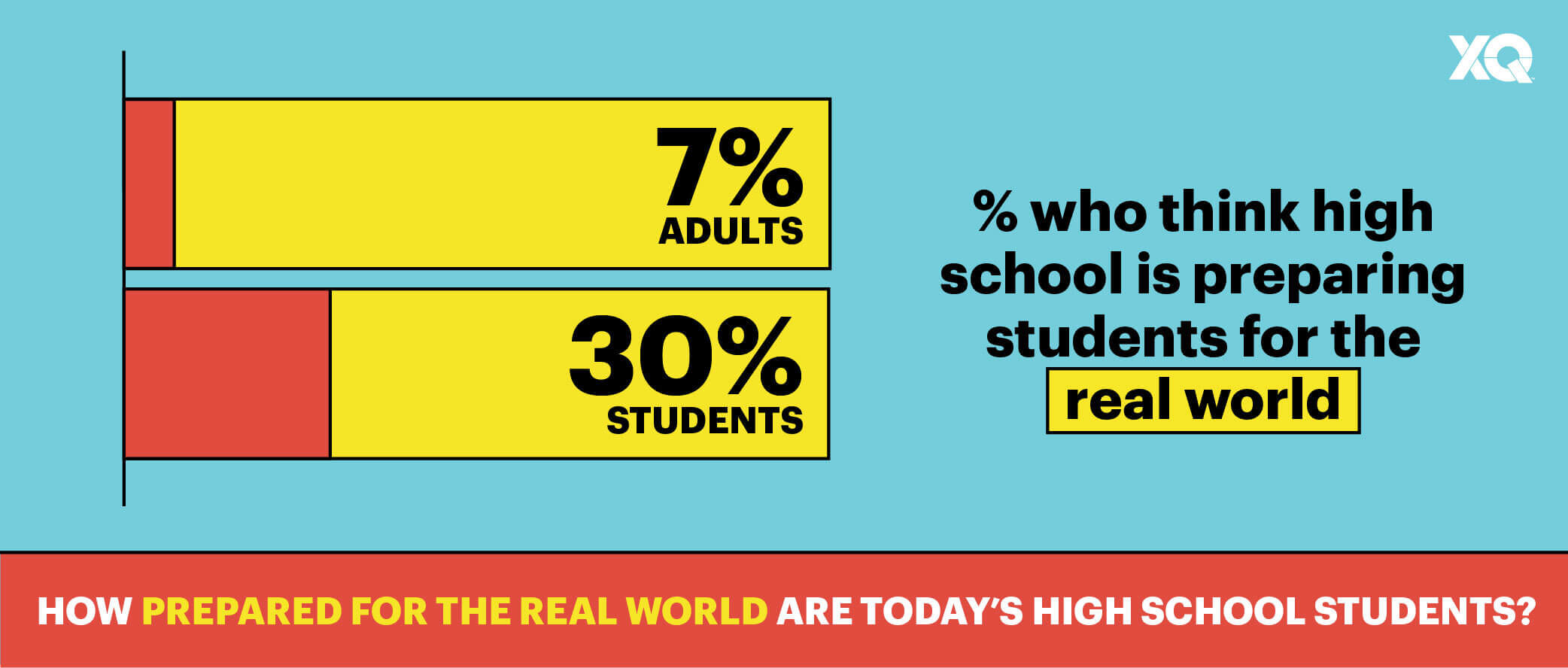
This tracks with 2022 data from a survey by Cengage , finding that 65 percent of employers were struggling to find talent. The respondents revealed a contradiction: even though they required college degrees, they ranked skills training credentials (43 percent) and real-world experience (28 percent) more important than a two- or four-year degree (26 percent) when considering an entry-level candidate. High schools can play an important role in providing more of those experiences through internships, apprenticeships, and work-based learning.
We used the results from our audience poll to launch a series of conversations with different education experts about how high schools can better prepare all students to graduate with the skills and opportunities to pursue the futures of their choice.

Does school prepare students for the real world?
When we asked students in our audience poll to rank how prepared they feel for the real world on a scale of 1-5, with 5 being the highest rating, only 30 percent rated their preparedness at a 4 or a 5. This is a low number, not even a third. That wasn’t surprising to the educators and researchers we spoke with, especially considering students’ recent lived experiences.

“‘The real world’ is undergoing rapid change, which can be daunting as well as exciting. Near the end of 2022, the world got an up-close look at how artificial intelligence can now craft essays and poetry, write code, even pass the bar exam. Imagine trying to envision the world in ten years, in 20 years, if you are a teenager thinking about how to prepare for the ‘real world’ after high school.”
– Craig Jerald, XQ Consultant and former vice president for policy at the College Board.
This uncertainty is clear in the job market students will face after graduation. A 2021 report from McKinsey & Company on the future of work after COVID-19 showed how jobs performed by humans are becoming increasingly automated. The pandemic accelerated this shift: the report found that up to 25 percent more workers than previously estimated may need to switch occupations.
At the same time, a significant number of high school students will graduate and immediately enter the workforce. A 2020 report from the National Center for Education Statistics found a third of all high school graduates are not going straight to a two- or four-year college . This trend appears to be on the rise as a result of the COVID pandemic, as even fewer high school grads head straight to college. Those students, in particular, will need to graduate with work-ready skills.
Do High Schools Prepare Students for Careers?
Yet, high schools overall have not adapted to the changing workforce. Most comprehensive high schools don’t provide adequate opportunities for students to gain real-world experience through career and technical education programs. As a result, students don’t get the chance to develop their skills or explore potential career paths. This might be why only 7 percent of the adult, non-student respondents to our audience poll rated high school students’ preparedness for the real world at a 4 or 5, the top two scores. They’ve experienced or witnessed the lack of preparation as employers, colleagues, or educators.
In school, students face outsized pressure to succeed on standardized tests. But these tests often do a poor job of reflecting what young people actually know and are able to do, while also failing to encourage the kind of meaningful, engaged learning students need to succeed in real-world situations. “Students are sitting in our high schools the same way that they did 100 years ago when we have internship opportunities, we have career pathways that can be explored in 9th grade,” U.S. Education Secretary Miguel Cardona said in 2022 on the podcast version of “The Problem with Jon Stewart.”
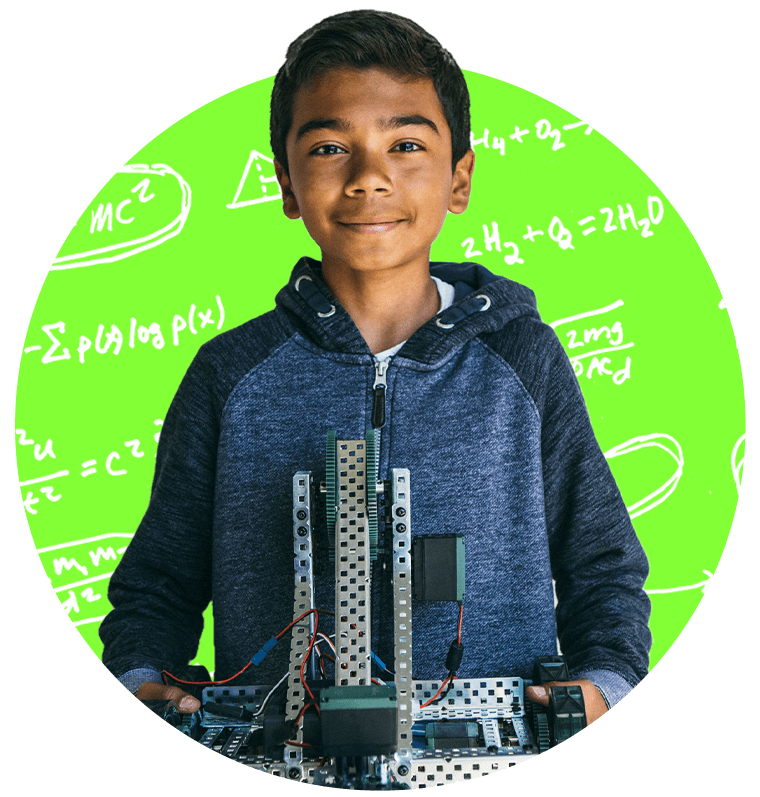
“We’ve gone so far away from thinking about how students learn in community, how they learn in collaboration with one another independently. I can’t tell you how often I’ve learned by arguing with somebody.”
– Jose Vilson , executive director of Educolor.
Vilson, a veteran New York City teacher at Educolor , agrees with other educators and labor experts who say high school should give students authentic opportunities to develop in-demand skills like critical thinking, adaptability, creativity, problem-solving, and collaboration.
This need was amplified by the declining 8th grade scores in civics and U.S. history on the National Assessment of Educational Progress, or NAEP (also referred to the Nation’s Report Card)—meaning they weren’t prepared for the higher level work required in high school.
The average score dropped 5 points on the NAEP US history assessment between 2018 and 2022. This continued a trend of declining scores that began in 2014. Just 14 percent of 8th grade students scored at or above the NAEP proficient level in US history. And the average score on the 2022 civics assessment declined by 3 points since students last took the test in 2018. Only 22 percent of 8th graders scored at or above the NAEP Proficient level in civics.
“Education leaders and policymakers must create opportunities for students to gain the knowledge and skills they need to catch up and thrive,” said Beverly Perdue, National Assessment Governing Board chair and former North Carolina governor when the results were released in May 2023. “The students who took these tests are in high school today and will soon enter college and the workforce without the knowledge and skills they need to fully participate in civic life and our democracy.”
In another distressing sign, the NAEP Long Term Trend assessment found math and reading scores for 13-year-olds also fell in the 2022-23 school year to some of their lowest levels in decades.
Are High Schools Preparing Students for College?
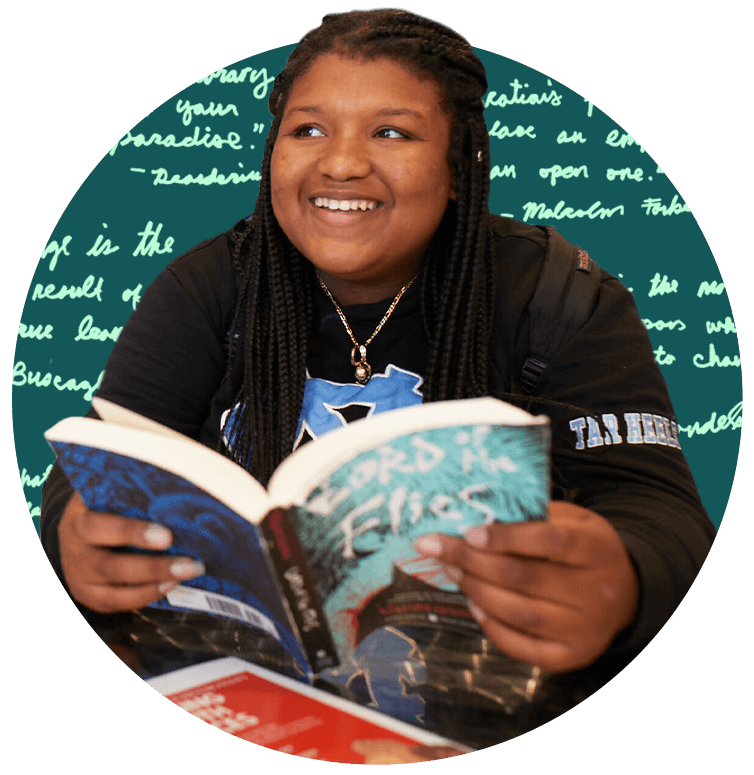
Why is it important to prepare for life after high school?
High school should prepare students not just to meet the future but shape it. No high school curriculum can prepare students for every challenge they might encounter. But the experts we spoke to agree: by preparing students with adaptable, real-world skills and competencies, schools can set students up to pursue lives of choice and purpose.
Are High Schools Preparing Students for the Future?
XQ defines these skills through our research-based Learner Outcomes : concrete, relevant knowledge and skills that students can apply to succeed in a 21st-century context. By designing learning around these goals, schools can prepare students to meet the future. Drawing on research, existing academic and social-emotional frameworks , and practical expertise, we’ve identified a set of competencies and sub-competencies that align with our learner outcomes.

-Lauren Bierbaum, Head of Data, Research, and Evaluation at XQ Institute.
Washington Leadership Academy (WLA) , an XQ school in Washington, D.C., uses the learner outcome Masters of All Fundamental Literacies to prepare students for high-wage STEM jobs. At WLA, all students take four years of computer science, with opportunities to build their skills through real-world internships. WLA also challenges students to take on meaningful issues in their community and supports them as Original Thinkers for an Uncertain World , another learner outcome. For example, one class of students focused on the question, “How do social justice movements work?” ultimately creating a guide for the next social justice movement. After four years of computer science, including computational art and computational music, 2022 WLA graduate De’Von said he felt “probably more prepared than any other kid in America” as he graduated and headed to Morehouse College.
De’Von’s experience is an example of what can happen when high schools design learning around relevant skills and competencies. XQ has identified six research-based Design Principles for successful schools—which include Youth Voice and Choice .
“Most high schools don’t provide students with much voice, choice, and independence in what and how they learn, nor do they ask students to work collaboratively in teams that tackle authentic problems or challenges,” said Jerald. He examined data on the 1,721 graduates of XQ’s 16 original Super Schools and found that “about 84 percent said they felt prepared for their future, and half of those students cited collaborative skills they developed in high school as a big reason why.”

– Keri Rodrigues , president of the National Parents Union.
Crosstown High , an XQ school in Memphis, Tennessee, prepares students for life after high school through a curriculum that’s built around competencies . Located in the Crosstown Concourse, Crosstown High shares space with businesses, non-profits, health facilities, and civic groups. Through close collaboration with community partnerships —like working with a local graphic designer to design logos for a student-run business, or collaborating with a local elementary school to design a sensory walk for kids—students gain exposure to a wide range of future options and develop a sense of their own future goals.
These experiences position students with the confidence and self-knowledge they need to meet the challenges of the future. As Crosstown 2022 graduate Ava explained: “What I’ve realized in my past four years here is that learning isn’t just English, math, science, and history. It really is learning about yourself, learning about how you interact with everybody else in the environment around you.”
How do you prepare students for the real world?
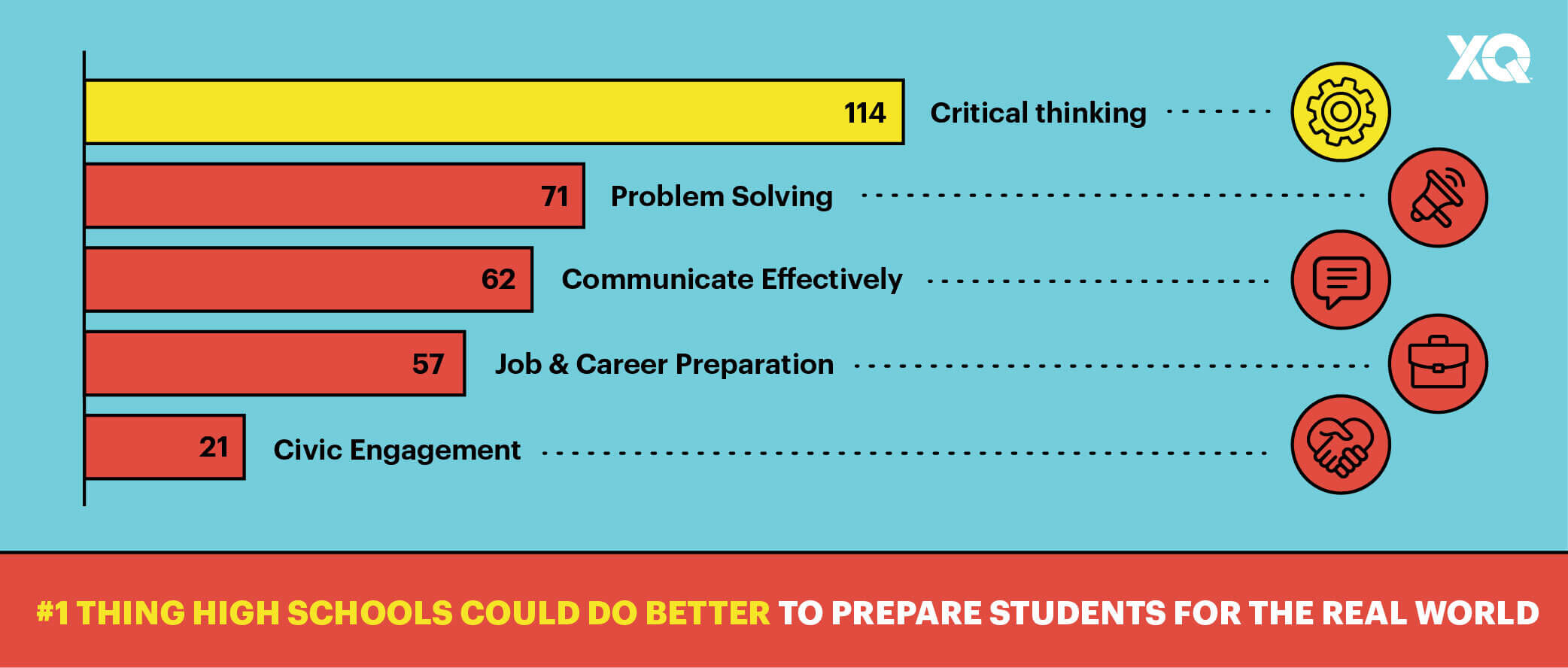
T hese are among the most important skills cited by the U.S. Department of Labor , which also lists professionalism, networking, and enthusiasm.

– Dan Domenech , executive director of the American Association of School Administrators .
T he best way to teach these real-life skills is to give students opportunities to develop them in real-world contexts. As noted earlier, schools can provide these opportunities through Community Partnerships another one of XQ’s Design Principles . Through partnering with cultural institutions, local businesses, nonprofits, and colleges and universities, schools can give students the opportunity to apply their learning outside the traditional classroom environment.

– Chelsea Waite , senior researcher at the Center on Reinventing Public Education .
Waite has been studying different designs for learning at many types of schools with the Canopy Project . “The division of ‘high school’ and the ‘real world’ is a real culprit here,” she said when asked about the low levels of confidence students and adults in our poll expressed about the ability of U.S. high schools to prepare students for the future. “No one can be adequately prepared for a new stage of life when nothing about their current reality resembles what they’re about to encounter. High schools can, and should, be places where students are living and learning in the real world, and learning to navigate the systems and institutions they’ll encounter throughout their lives.”
This is why XQ encourages nontraditional approaches to when, where, and how high schoolers learn—a design principle we call Smart Use of Time, Space, and Technology . Schools can break away from science, history, and other single-subject periods, the way the XQ school Purdue Polytechnic High School in Indiana has done, by combining different subjects in longer blocks with project-based learning and through partnerships with local industries and nonprofits.
Círculos —an XQ school in California’s Santa Ana Unified School District—uses community partnerships to prepare students to succeed after graduating, most of whom are first-generation Americans and qualify for free or reduced-price lunch. Past projects have focused on public arts, reducing community consumption of single-use plastics, problematic representation of Black and Latino people in the media, and drought preparation in California. Students develop and pitch ideas for these projects based on community needs. In doing so, they develop critical thinking and problem-solving skills and practice communication by presenting their ideas to partners.
Rodrigues, of the National Parents Union, said more high schools should be looking outside their walls for ways to give students important learning experiences. “These are the skills that kids really need to be able to access opportunity” beyond their educational background, she said, referring to “the skills to keep a job and to be successful in a job, and to blossom and thrive.”
All the things that we want our kids to do, but we give them no practice,” she added. And frankly, having that real-world experience where [you see] what it’s like to actually be in the workforce and have those real-life examples, you also get the opportunity to figure out—is this what I really want?
Domenech pointed to High School District 214 in Cook County, Illinois as an example of breaking down the barriers between high school and the real world to give students valuable, hands-on experiences. The district’s innovative Youth Apprenticeship provides concrete job skills and training to students beginning their junior year of high school. Domenech described the goals of the program: “You want to go into medicine? Well, guess what? You’re going to spend a couple of days a week in the hospital, trailing a nurse or trailing a doctor and finding out what it’s really like.”
Students in the program receive paid job training, as well as college coursework and mentoring. Ultimately, students who complete the program receive an apprenticeship certification or a youth apprenticeship certification in addition to up to a year of college credits. Student Edin Hozic described a cybersecurity internship in an article for the district’s blog : “It gives us hands-on experience. We can really see what these industry professionals are doing and how they are using these programs to secure these networks and systems. I really value the overall experience we gain here.”
More schools are following suit. Maryland will invest $12 million of pandemic stimulus funds into expanding access to apprenticeship programs in high school through a new grant program, Maryland Works . Currently, only 7 percent of Maryland high school students graduate with apprenticeship credentials; this investment will help Maryland meet its ambitious goal of graduating 45 percent of students with apprenticeship credentials by the 2030-31 academic year.
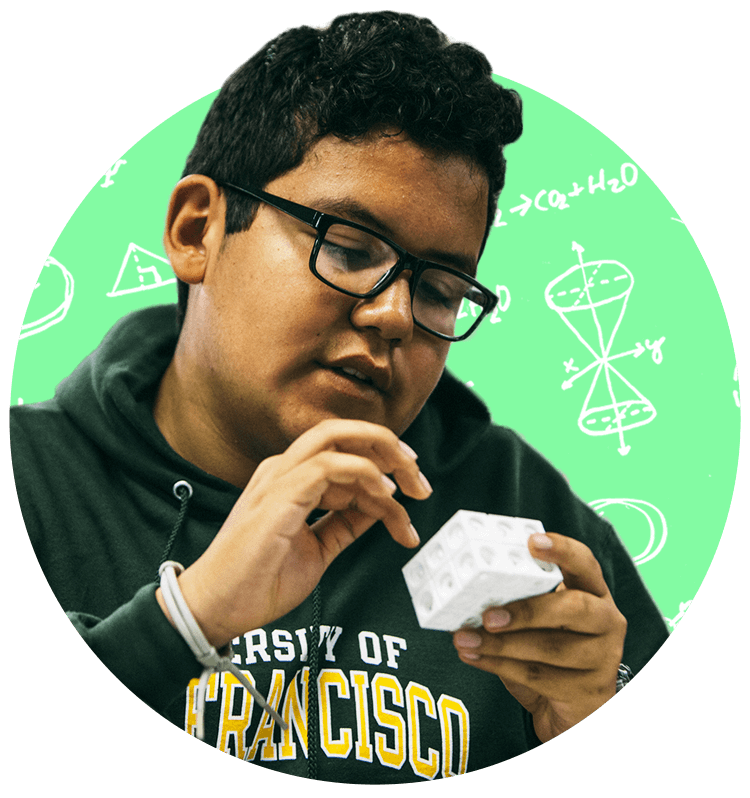
- Engage students in real-world projects with industry partners
- Use rigorous coursework to prepare students for real jobs
- Align design principles with internships
What skills do students today need to be successful in life?
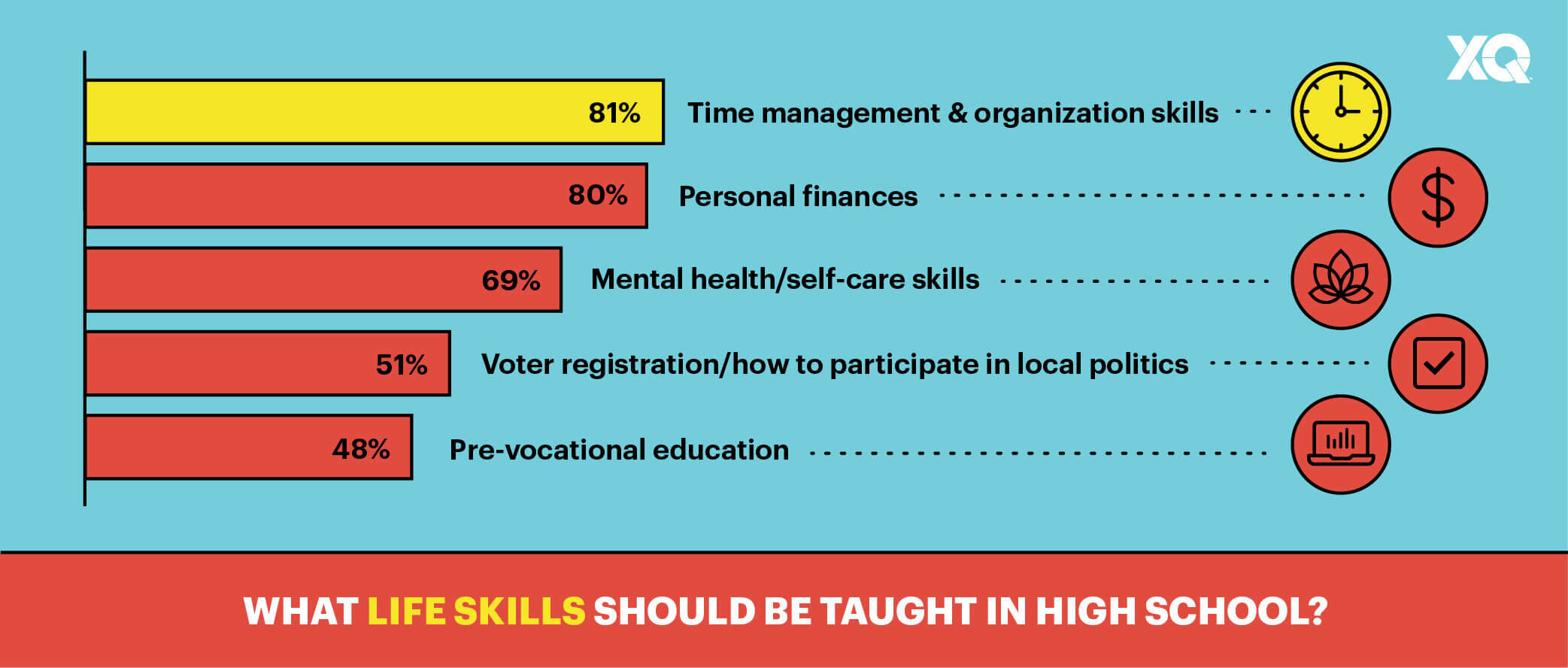
– Yolanda Fordham Director of the Liberty Partnerships Program at NYU .
In New York State, the Liberty Partnerships Program (LPP) provides students with services designed to improve their ability to graduate from high school and enter postsecondary education and the workforce. This is especially important for students at risk of dropping out of school. Fordham, who directs the LPP at New York University, said, “Services begin with a socio-emotional assessment, followed by intervention strategies provided in partnership with the school. Personal Learning Plans (PLPs) are developed with students to generate academic, college, career, and personal goals. The PLP is revisited at least three times per year.”
This personalized approach to supporting students’ social-emotional wellness aligns with another XQ Design Principle: Caring, Trusting Relationships . “Research tells us that having even just one close relationship at school can do wonders for supporting students’ learning and development,” said Bierbaum.
For example, at Da Vinci Rise High School , an XQ school in Los Angeles, California, students build relationships with adults through advisory group meetings, one-on-one personal check-ins, and wellness hours. RISE serves students navigating foster care, housing instability, probation, and other disruptive circumstances. Focusing on relationships helps these students build real-world social and emotional learning (SEL) skills around mental health and self-care, like meditation and mindfulness.
Schools can also empower students with real-life skills by giving them more responsibility for their own learning. That’s the idea behind youth voice and choice: giving students a say in what and how they learn. Experts believe students need a chance to develop these tools in high school in order to succeed wherever they go next.
“Consider that students from PK through 12 have their time more or less managed for them,” said Vilson. “And students are generally never too far away from the class that they have to go to next. So, they hear a bell, and they generally know that they have to go to another class and that they have to follow a program. …So then when they get to college, they’re pretty much told, ‘Hey, here’s the schedule, but there’s not going to be a bell.”
At Grand Rapids Public Museum School (GRPMS), a district school in Grand Rapids, Michigan, that partners with XQ, students take leadership over their own learning. Located inside the home of the former Grand Rapids Public Museum, the school’s students have a high degree of freedom in completing projects, often in conjunction with community partners. For example, students designed and built their own rockets while learning about the history of the Space Race. Learning at GRPMS is competency-based : students progress through content based on their mastery of the material, not the time they’ve spent in their seats, and students play a leading role in guiding and evaluating their own learning.

Jerald summed up the core tenets behind GRPMS’s approach to teaching real-life skills alongside academics: “Position learning within the broader community, require students to interact with adults outside the school as part of their learning, and challenge students to engage in interdisciplinary, collaborative projects with real-world connections. High schools need to do that as an integral part of their core instructional model, not as just one special class or an extracurricular activity.”
The success of this approach is borne out in the student experience. One 2022 graduate, Aeden, told XQ, “It would definitely help you develop more in your time management skills as well as … in your cognitive thinking.” He added, “From my understanding of traditional schools, that isn’t something that is usually emphasized a lot because there’s a specific structure you have to follow.”
Another GRPMS graduate, Christopher, expanded on this concept: “I talked with some people from research professions at Grand Valley State University and learned more about what they did to get where they are and what they do as scientists and just overall how they function in society,” he said. “And that’s helped me a lot just understanding how disciplined I need to be, working with time management, but also just preparing me to learn on my own, since it was a completely self-led project.”
The consensus from our community and from expert perspectives is clear: too many of today’s high schools aren’t preparing students well for real life. Their students graduate without the skills to set and achieve their goals for the lives they want to live, in terms of career, post-secondary education, or their role in their community.
It’s impossible to predict every challenge students will face when they enter the real world. But success stories from high schools across the country show that, with creativity and bold thinking, school leaders and teachers can set students up with the skills, adaptability, and resilience to meet whatever the future holds. To better prepare students for the real world, schools can:
- Build community partnerships that connect students with real-world contexts
- Increase opportunities for self-directed learning, where students learn crucial life skills like organization, problem-solving, and critical thinking
- Integrate social and emotional learning (SEL) to support students’ mental health and cognitive development

At XQ, we’ve designed a series of open-sourced tools to help schools prepare students for the demands and challenges of the real world. Our research-backed Design Principles are foundational to the design of XQ schools across the country, and can help school leaders rethink how to better design their school structures. We have also developed the Design Principles Rubric to help teams assess where they are in their design journey.
Likewise, the XQ Learner Outcomes are research-based, comprised of concrete, relevant knowledge and skills schools can use to support and plan student outcomes. XQ’s 37 Competencies can help educators identify the granular skills students will master as they prepare for an ever-dynamic, increasingly complex 21st century world.
To start a conversation about how to transform your school, watch this video and check out XQ In a Box .

For more on how high schools can prepare students for the future, explore our posts:
- High School and the Future of Work , a policy guide
- How Schools Use SEL to Prepare Students for an Uncertain Future
- From the Classroom to the ‘Real World’
- How LAB Internships Are Setting Up Scholars for Success Inside and Outside the Classroom
- How Youth Climate Activist Jerome Foster II Became the Voice for One Million Young People
- Project-Management for the Brain: Teaching Executive Functioning Skills for Students
- How Going to High School in the Pandemic Affected Us When We Got to College
- High School Graduates: Preparing for Your Next Step , tips for students
Sign up for our newsletter
Get the latest educator insights and practical classroom tips every other week, direct from the XQ community
Get in touch: Support | Careers | Press
Follow us to #RethinkHighSchool
Privacy Policy | Terms of Use
- Close Menu Search
- Entertainment
- Classes and Club Happenings
The Stampede
The Student News Site of Clearfield Area Junior-Senior High School
Does high school prepare students for the real world?
Summer Wynn , Staff Writer March 2, 2021
High school has always been said to prepare students for the challenges that they will face later in their lives. This is done by helping students use problem solving skills as well as thinking through issues in a logical way. But are students really being prepared for the real world after high school or is there more preparation that could be done to help them succeed?
When you ask an average high school student if they know how to file their taxes, most of the time they will look at you with a puzzled look and say: “We were never taught that.” If you ask the same student if they can prove a theorem for geometry or explain how to set up an MLA style research paper, chances are they will be able to. Although knowing theorems and how to set up research papers are very important to make it through high school, chances are a student will not have to use those skills past college.
But why do schools not teach students the skills that they need to make it through the real world? The answer is a bit unclear. On one side of things, most schools focus on academics rather than real-life skills in order to help students make it into college. Teaching students these important skills does not seem as necessary to schools since many real-world skills can be learned on one’s own.
Some schools do offer electives that students can choose to take that will help them learn a few skills that will help them survive on their own in the future. Here at Clearfield, that class is offered as Life Beyond High School and is not mandatory for students to take but is offered as an elective. Personally, I believe that all students should be required to take at least one semester of this specific class in order to help them prepare for the next chapter of their lives that are right around the corner.
Life Beyond High School teaches important skills such as how to manage and pay student loans, how to manage your income as a family, and how to read and file taxes. Many of these different ideas are not taught outside of this class in an academic setting, making this class very valuable. I found myself coming out of the class with more knowledge about the real world and how my life would soon be than ever before. Overall, I feel like teaching life skills that are not exactly “academic skills” is beneficial to students.
- Life Beyond High School
Hello! My name is Summer Wynn and I am a senior in high school. In my spare time, you can find me buying sneakers to add to my extensive collection, working...
Course Recommendations from a Senior
Review: Denny’s Beer Barrell Pub
Rating Shoes I Had/Have
The Unveiling
Tyler’s Cryptids: Thunderbird
A Journey Through J. Cole’s “KOD”
Christmas Classics
Tyler’s Cryptids: Chupacabra
Superstitions
HISTORY OF HALLOWEEN COSTUMES
- Share full article
Advertisement
Supported by
How Best to Prepare Students for Life
To the Editor:
Susan Engel describes an experiment in Massachusetts in which eight students designed and ran their own school within a school (“ Let Kids Rule the School ,” Op-Ed, March 15). The experiment exploited a powerful motive seldom visible in academic classrooms but familiar to anyone who ever participated in an extracurricular activity: don’t let the group down.
Fine. Now, how does Ms. Engel plan to “scale up” the idea to include the roughly 15 million young people enrolled in public high schools, many in classes expected to exceed 30 students, some expected to approach as many as 60?
We are often captivated by education programs that appear to work wonders for a small group of self-selected students. Though often inspiring, they are more of a tease than a solution to our education woes. Francis Schrag Madison, Wis., March 15, 2011
We need more commentaries like Susan Engel’s to illustrate what self-motivation means to high school students. Kudos to those teenagers in the Independent Project for proving that, when it comes to learning, one size does not fit all, and test prepping is the antithesis of education.
Even within a standardized curriculum, there must always be room for inquiry, critical thinking and independent study. Once students realize that they can actually enjoy being responsible for their own learning, under the watchful eye of experienced teachers, they will never want to give it up.
Gloria C. Endres Philadelphia, March 15, 2011
The writer is a retired teacher.
Your March 15 issue provided examples of education at the poles of a polarized nation. Susan Engel’s excellent Op-Ed essay, “Let Kids Rule the School,” described the powerful outcomes possible when authentic learning is privileged over standardization and stress. On the news pages was a horrifying report of a New York mom suing her daughter’s preschool, arguing, in effect, that it had failed to start her child on the inexorable march to the Ivy League (“ Suit Faults Test Prep at Preschool ,” March 15).
A practice test prep question: A child emerging from which scenario would be a more appealing candidate to a college admissions officer, Ivy League or otherwise? Steve Nelson New York, March 15, 2011
The writer is head of the Calhoun School.
Re “Suit Faults Test Prep at Preschool”:
Great news! Now a person can sue a nursery school using the Ivy League argument — as in, my child won’t get in if all she does at age 3 is learn her colors.
I can only imagine how continually frustrating it must be for educators to be unable to persuade parents that, as professionals, they know what is the best learning environment for children at each stage — that for a 3-year-old to be “dumped” into a group of her peers to delight in colors and shapes is important learning for her, and that imaginative group play at the nursery level is essential preparation for what is to come. Margaret McGirr Greenwich, Conn., March 15, 2011
Oh, good grief. The nursery school you go to doesn’t determine where you end up in life. Kids deserve a childhood and need time to be kids.
My three kids went to local church-sponsored nursery schools and a very diverse middle-class public school. They attended excellent colleges — Williams, George Washington and Northwestern — and got good job offers in their fields before graduation.
The preschool mother who brought the lawsuit against the school needs to chill out — for her daughter’s sake.
Elizabeth A. Letzler Baldwin, N.Y., March 15, 2011
Sample details
- Child Abuse
- Views: 2,067
Related Topics
- Standardized Testing
- English Language
- Purpose of Education
- Writing Experience
- Philosophy of Education
- Higher Education
- Female education
- Vocational education
- Technology in Education
- Importance Of College Edu...
- Critical Thinking
- Right to education
- Study skills
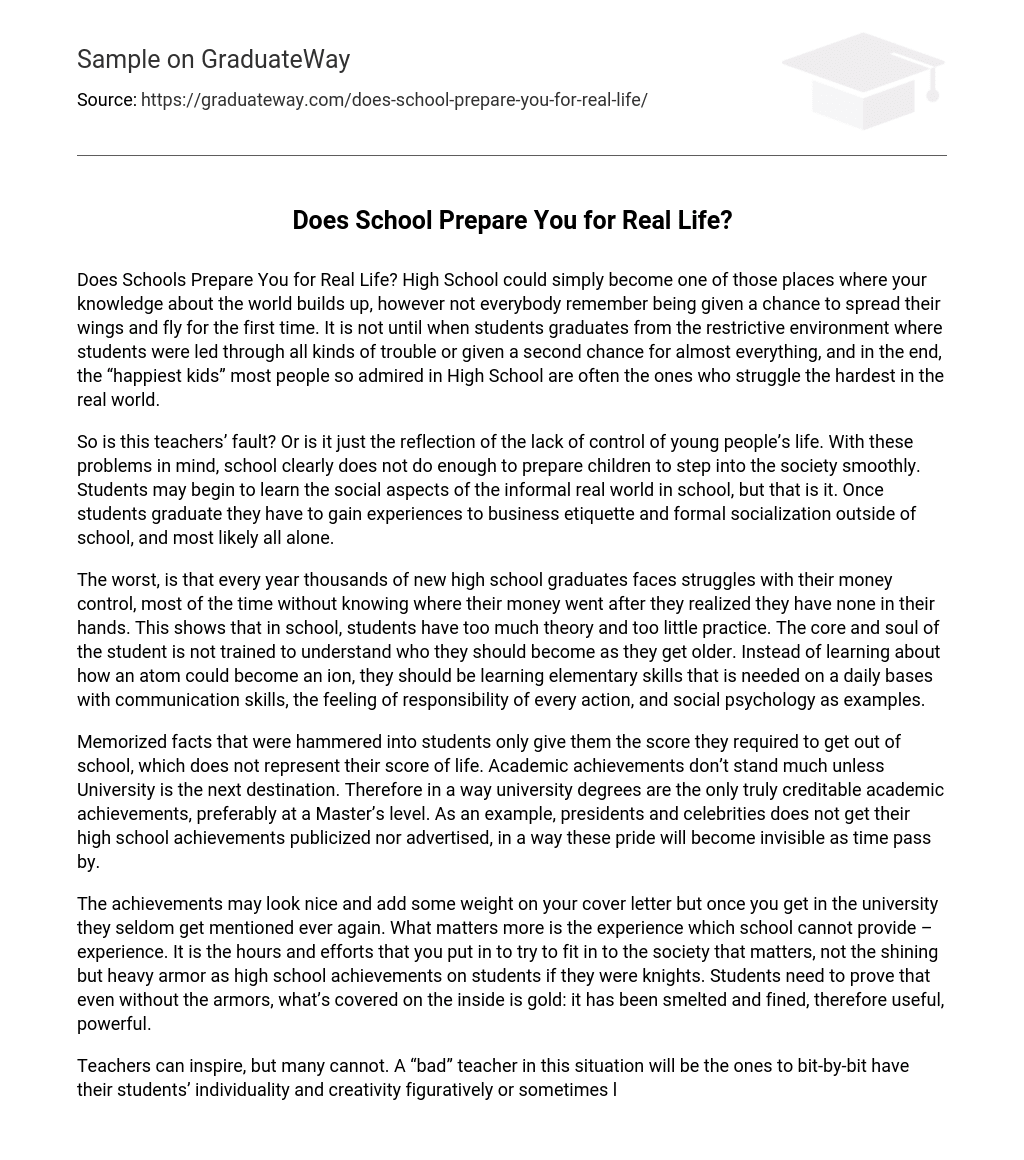
Does School Prepare You for Real Life? Argumentative Essay
Does Schools Prepare You for Real Life? High School could simply become one of those places where your knowledge about the world builds up, however not everybody remember being given a chance to spread their wings and fly for the first time. It is not until when students graduates from the restrictive environment where students were led through all kinds of trouble or given a second chance for almost everything, and in the end, the “happiest kids” most people so admired in High School are often the ones who struggle the hardest in the real world.
So is this teachers’ fault? Or is it just the reflection of the lack of control of young people’s life. With these problems in mind, school clearly does not do enough to prepare children to step into the society smoothly. Students may begin to learn the social aspects of the informal real world in school, but that is it. Once students graduate they have to gain experiences to business etiquette and formal socialization outside of school, and most likely all alone.
ready to help you now
Without paying upfront
The worst, is that every year thousands of new high school graduates faces struggles with their money control, most of the time without knowing where their money went after they realized they have none in their hands. This shows that in school, students have too much theory and too little practice. The core and soul of the student is not trained to understand who they should become as they get older. Instead of learning about how an atom could become an ion, they should be learning elementary skills that is needed on a daily bases with communication skills, the feeling of responsibility of every action, and social psychology as examples.
Memorized facts that were hammered into students only give them the score they required to get out of school, which does not represent their score of life. Academic achievements don’t stand much unless University is the next destination. Therefore in a way university degrees are the only truly creditable academic achievements, preferably at a Master’s level. As an example, presidents and celebrities does not get their high school achievements publicized nor advertised, in a way these pride will become invisible as time pass by.
The achievements may look nice and add some weight on your cover letter but once you get in the university they seldom get mentioned ever again. What matters more is the experience which school cannot provide – experience. It is the hours and efforts that you put in to try to fit in to the society that matters, not the shining but heavy armor as high school achievements on students if they were knights. Students need to prove that even without the armors, what’s covered on the inside is gold: it has been smelted and fined, therefore useful, powerful.
Teachers can inspire, but many cannot. A “bad” teacher in this situation will be the ones to bit-by-bit have their students’ individuality and creativity figuratively or sometimes literally beaten out of them. Children living in Canada are extremely lucky compared to the ones living in the United States and China. In the United States 19 states decided that spanking in school is legal. Even worse in China, where over 40% of the students of a 50-student-class have been spanked.
The over use of criticism and corporal punishment in school is too common nowadays and can lead to blockage of a child’s personality development at such a young age. This could turn a sunny child into somebody full of the fire of hatred later on becoming criminals or outlaws in the society, creating trouble. Finding and getting the right teacher with the right teaching method is such an critical part of high school life, yet we always hear complains from students about their teachers; so what is the point of putting a kid with the wrong adult who might not provide the kind of love and knowledge youngsters are lack of?
Mark Twain once said: “I’ve never let my schooling interfere with my education. ” I strongly believe in this sentence since on one hand this quote does not deny that one cannot learn in school. However Twain is saying that there are many things, some of the most significant in life, that you cannot learn in lectures or textbooks are: love, friendship, coping with loss, compromise, the meaning of life, and life in general. Luna Wang 2013. 1. 10
Cite this page
https://graduateway.com/does-school-prepare-you-for-real-life/
You can get a custom paper by one of our expert writers
- Importance of Education
- Sex education
- Child neglect
- Child sexual abuse
- Brown V Board of Education
- Writing process
Check more samples on your topics
How far does act 1 of “the crucible” prepare the audience for the drama to follow.
"The Crucible" was written by Arthur Miller and is performed all over the world. Many clues contribute to the way people question this play and how the dramatic suspense is built up. Details help create the atmosphere and keep the audience interested. Many meanings and allegory can be taken from this play with the help
School should do more to prepare students for non-academic aspect of adulthood
Schools should do more to prepare students for the non- academic aspect of adulthood Children and parents consider school as the second home. Teachers are considered as surrogatory parents. Children learn a lot in schools, and these lessons form an integral part of a child’s life. The basic values and characteristics of an individual is formed
How did my school prepare me for my medical job?
Pharmacology
Although there are many medical professions that I am interested in, anesthesiology has particularly caught my eye. To achieve my goal of becoming an anesthesiologist, I must go through a good education pathway first. I am currently at DeBakey high school, which is a health professions school and after I graduate I hope to go
What Has Helped Prepare Me For The Next Step In Life
Things that happen to us in the beginning of our lives, during childhood, very often have a great impact on our entire existence in this world. In my early teenage years, I began wondering and pondering on what my future would hold and how I would achieve a career that I would love. It wasn’t
Public School Is Better than Private School Argumentative Essay
When choosing the best path for a successful future, students and parents often contemplate this question: Should they choose a public school or a private school? In my view, selecting a public school is better than opting for a private one. The decision depends on various factors such as the student's performance, abilities, and the
Reality Shows: Real or Fake Argumentative Essay
Reality television
What is a Reality Show? A television reality show features talent culled from the ranks of 'ordinary' people, not professionally trained actors. Reality show producers typically shoot hundreds of hours of footage per episode and use creative editing to create a narrative thread. Subjects of a reality show may be given some rudimentary directions offscreen,
Prepare Students for the Future
There are many paths to self-fulfillment and a productive life. It is the high school’s job to teach these teenagers how to achieve their dream and to give them the resources to do it, all the while making the world a better place. Students must learn how they can benefit the community around them. Therefore,

Food Has Become Easier to Prepare
Food has become easier to prepare. Has this change improved the way people live? Use specific reasons and examples to support your answer. Of course, nowadays food has become more easier to prepare. Think about microwave-ovens, mixture, grinding machine, rice-cooker,pressure cooker,I think you already got the answer, right? In my point of view, the improvement
How to Prepare for an Interview
Risk Assessment
UP outline how legislation, policies and procedures relating to health, safety and security influence health and social care settings MI describe how health and safety legislation, policies and procedures promote the safety of individuals in a health or social care setting UP carry out a risk assessment in a health or social care setting MM

Hi, my name is Amy 👋
In case you can't find a relevant example, our professional writers are ready to help you write a unique paper. Just talk to our smart assistant Amy and she'll connect you with the best match.

Golden Arrow

Does school adequately prepare students for life after high school?
School, which is enforced by law, may not be as beneficial as we like to think.
Andrea Huang , Staff Writer | January 28, 2018

Cartoon by Jihyun Kim
Starting from the seventh century, school has been something that was glamorized. In fact, even more importance has been placed on school since the United States established a law in 1918 making attendance mandatory. However, school has since lost its usefulness and connection to real life.
Schools do not connect learning material to how they can be used in the outside world.
According to a TED-Ed Blog, “Does school prepare you for the real world?”Aliezah Hulett believes that “Traditional topics such as calculus and Shakespeare should not be neglected, but teachers should be able to ask their class, ‘Now, how can we use this lesson outside of the classroom?’”
Everything that students learn should have lesson connected to it, so students are both more likely to remember the material and benefit from it. For example, a lesson that could be learned from reading Into the Wild is to always go into something prepared and make sure at least one trusted person knows what you are doing and where.
Everyday life skills such as accounting are not taught in required classes.
As mentioned in an article by the Odyssey, “Teaching things like study tips, how to write an effective argumentative essay for a job or college application, or even just how to do taxes are things that need to be taught in today’s schools.”
Although schools do expose students to valuable skills such as perseverance, responsibility, and social skills, they do not account for the skills used in day-to-day life. For example, school does offer classes that teach students how much to tip in a restaurant, how to prepare for a job interview, write a resume, or even how to pay common bills.
Schools do not put enough effort into making sure students have a plan after high school.
The many interviews and surveys conducted by William Damon indicate that “only about one in five young people in the 12- to 22-year age range express a clear vision of where they want to go, what they want to accomplish in life, and why. Almost 60 percent may have engaged in some potentially purposeful activities, or they may have developed some vague aspirations, but they do not have any real commitment to such activities or any realistic plans for pursuing their aspirations.”
High schools generally aim to prepare students for college, but they do not make sure that their students actually go to college or have a plan on how they are going to succeed in life. For instance, it would be helpful to make it a graduation requirement to have a plan for the future, even if its a plan that might change.
Even though schools do teach helpful skills like perseverance, responsibility and social skills, they fail to connect the material to why it matters and struggle to make sure that students can be independent after high school.

Hey guys! My name is Andrea Huang and this is my first year being part of the Golden Arrow. I am super excited to be writing stories for our school newspaper...

Legacy Admissions: An Outdated Continuity of American Disparity

College Isn’t the Only Path to Success

Cartoon Page: Feeling Detached

Celebrity Culture: A-List Danger and Distraction
Staff Editorial: We Need to Counter the Spread of Polarizing Information on Social Media
In a society that constantly scrolls, likes and posts, today’s youth have access to much more information than in past generations because of the gr...

HEAD TO HEAD: Cancel Culture

Threadbare Truths: Navigating Sustainability in Generation Z’s Secondhand Fashion Wave

Cartoon Page: A Seizure of Identities
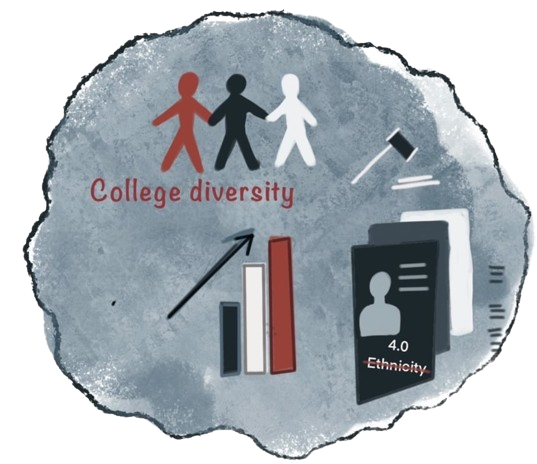
Staff Editorial: The Adverse Nature of Affirmative Action Being Politicized
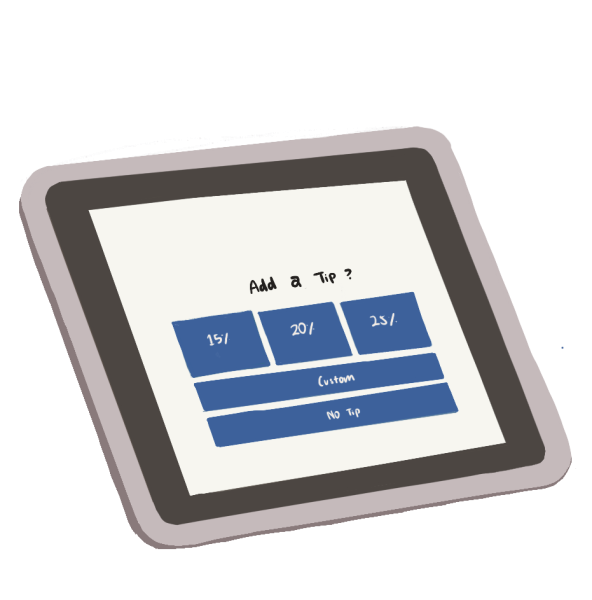
Tip of the Iceberg: Confusion Around Tipping Culture
The student news site of Woodbridge High School
- Advertising
- Latest Issue
Academia.edu no longer supports Internet Explorer.
To browse Academia.edu and the wider internet faster and more securely, please take a few seconds to upgrade your browser .
Enter the email address you signed up with and we'll email you a reset link.
- We're Hiring!
- Help Center

Does School Prepare Us for Life

This was an essay that I wrote long time ago during my preparation for examination. I was glad that I finally managed to republish the article online today. I was inspired to post this article after reading the thought-provoking 'Are undergraduates ready for the real world'. The school days are crammed with facts and figures, encompassing various subjects ranging from English to Mathematics. All of these require students to learn, memorise, understand and to be tested. Besides grades and examinations, the school also encompasses a wider curriculum including character moulding, citizenship building and personality development. Indeed, I think the school does prepare us for life. Firstly, the school teaches us self-discipline. We learn to keep to a schedule and to adhere to the timetable. We also learn to appreciate time and to be punctual. Moreover, we are trained to plan and manage time wisely. We also abide by and respect rules and regulations. The disciplined students will grow up to be disciplined adults and they will do well in their future undertakings. The school also helps to fortify our determination and perseverance. We learn to fulfil the demands of the school. We also learn to meet deadlines and hand in the homework on time. Moreover, we learn to face stress and pressure. In school, students learn to overcome challenges. Students with strength of character will be well-prepared to face the challenges of work and life in the future. Co-curricular activities are part and parcel of a student's life. They help to mould students' character and personality so that students learn to be confident. They help to hone the leadership qualities in the students themselves. Students learn to work together and cooperate with others. They also learn to appreciate good values like esprit de corps. Students learn to contribute positively and to put their best foot forward besides to take success and failure in their stride. We as the students learn to honour values of sportsmanship and fair play. Through co-curricular activities, students also learn loyalty, commitment and responsibility. When they grow up, they will work well as a team with others and committed in serious work. The school is a micro-society. The everyday social interaction is an excellent preparation for life in the society outside. In school, students have the opportunities to interact with other students from varied background, creed and race. Indirectly, they learn tolerance, acceptance and understanding. The students also have the opportunity to work and to mingle together. This can help to foster an open mind and promote unity. Just mention the word 'school' and images of grades and examinations come to our mind. Indeed students spend a lot of time and energy preparing and sitting for examinations. Along with that they gather a string of qualifications as well as knowledge and skills. They are crucial since they are the stepping stones and the foundation for the future. They can help students to secure a good job and successful career. In short, school does prepare us for life. It helps to nurture and to build strong character in ourselves. School also prepares students with the necessary 'tool' so that students can fit into society and contribute positively to the nation and people in future.
Related Papers
Matthew Rich-Tolsma
Euro Asia International Journals
, http://www.euroasiapub.org (An open access scholarly, peer-reviewed, interdisciplinary, monthly, and fully refereed journals.) ABSTRACT The aim of this study is to explain the role of education on social & economy development. Good education is constructive in nature which constructs our future forever. It helps a person to improve his/her status of mind, body and spirit. It provides us lots of confidence by giving us bulk of knowledge in many field. It is a single and vital way to the success as well as personal growth. We are incomplete without a good education because education makes us right thinker and correct decision maker. We can say that education is socially and personally an essential part of the human life. We
Science Insights
Insights Publisher
Education and life are entwined because life without education is almost impossible and education without life is definitely impossible. According to Guigno, (2017, May 4th), "Once you stop learning you start dying". This is very true because as you live, you learn either consciously and unconsciously. The kids of today are geared up to become adult citizens of tomorrow; their growth is parallel to the future of our country which is reflected in the quality of our present educational system. It is widely accepted and recognized that learning is an instrument through which children's personality and the way they deal with situations of life can be shaped and develop. This shift of thoughts from bookish knowledge to know about life and character development in the educational system has brought about magnificent changes in the lives of students and learners. People have started to see the fact that education is an essential key to a well-rounded development instead of the old mentality of just acquiring a degree and monetary success in life.■
ECNU Review of Education
Kevin Close
Dana Ilyassova
lidia sharon
Nurudeen A Raheem
Jessica FitzPatrick
I have attempted to explore what it is that school can do to prepare people to meet the challenges facing our world. It is my assumption that self-direction, responsibility, confidence, imagination and risk-taking would be on the short list of life-skills needed to meet these global challenges. The three areas of change in our education system I have focused on are content, environment and structure. The subjects we teach our children are currently segmented, distorted, and out of context, leading to false impressions about life and its obstacles. Subjects ought to be taught in context to their application and many required subjects should be evaluated for their relevance to all students. It is important to constantly reflect on and evaluate the desired aim or outcome of education to ensure a quality program. The buildings in which we educate our young can be redesigned to facilitate problem solving and investigation. The time and schedule of the day can be adjusted to encourage deep and meaningful study in interest driven groupings. Relationships within schools can more equally distribute power allowing individual students to control their education. All of the changes I have suggested call for choice and therefore freedom in education. It would mean that, as educators, we allow student to make important decisions about what, where and how they learn. The outcome of these changes will hopefully be a more competent citizenry, which demands changes from leaders when necessary or may oust them and take control, when changes are long overdue.
Maxwell Blake
school environment
raja naveed
ABSTRACT The study was carried out to investigate School environment helps to produce outstanding results in Pakistan kpk especially in abbottabad schools. The design of the study is descriptive while the population comprised principals and teachers in the education zone. The sample size for the study was 300 respondents while a researchers’ self developed questionnaire formed the instrument for data collection. Three experts validated the instrument and a cronbach Alpha reliability coefficient method was employed to ensure the reliability of the instrument. Four research questions and two null hypotheses guided the study; while student t-test statistics was used to test the hypotheses at 0.05 level of significant. A review of empirical studies was carried out to guide the researcher into previous studies in the area and also to provide the researcher with the theoretical base. A questionnaire was used to get information from the respondents. Based on the data collected and analyzed, the following results were obtained. That staff office, classroom spaces for teaching students and staff common room represented the major areas that to a great extent affect the academic achievement of students in public schools, with regard to buildings. It was also revealed that desks, current books and presence of library assistants constituted the areas of influence to the academic achievement of the students with regard to library services in the public secondary schools. Both the principals and teachers agreed that access to reading materials in the school, lack of facilities, and nearness to school and in sufficient qualified teachers greatly help to get outstanding result of student. Inadequate teaching materials were also noted as a major factor to get result of student. The two groups also shared common views in terms of the great influence of school health services, fencing of school for security and provision of power supply as important variable helps to get outstanding results of students of public schools. Based on the above, the researcher recommends that schools should be provided with functional libraries, equipped with current reading materials to help enhance both the students’ results and the teachers’ helps to get outstanding results in academic activities in the school.
Loading Preview
Sorry, preview is currently unavailable. You can download the paper by clicking the button above.
RELATED PAPERS
Christoph Teschers
Sasha Barab
Health Promotion Perspectives
Salvatore Colazzo
Perspektivy nauki i obrazovania – Perspectives of Science and Education
Publishing House L L C "Scientific and Educational Initiative"
Ulrika Bergmark
Handbook of Child Well-Being
Barry Schneider
HOW HIGH SCHOOL STUDENTS FROM SAN JOSÉ NATIONAL HIGH SCHOOL IN THE REPUBLIC OF PHILIPPINES ACADEMIC RESULTS GOT AFFECTED BY COVID-19: A COHORT STUDY
Journal of Vasyl Stefanyk Precarpathian National University
Yuliya Derkach
Asia Pacific Journal of Education
Deborah Widdowson
Lauren Resnicow
Sri Lanka Journal of Child Health
Sadhna Jain
- We're Hiring!
- Help Center
- Find new research papers in:
- Health Sciences
- Earth Sciences
- Cognitive Science
- Mathematics
- Computer Science
- Academia ©2024
School Doesn't Prepare Kids for the Real World
What would it look like if school prepared us for life?

Prisma is the world’s most engaging virtual school that combines a fun, real-world curriculum with powerful mentorship from experienced coaches and a supportive peer community
The Gap Between School and the Real World
A few years ago, a meme blew up online about what we learn in school. There were several variations, but the joke was that school didn’t teach skills like how to do taxes, buy a house, get good credit, or find a job, but it did teach...that “the mitochondria is the powerhouse of the cell.”
The meme was relatable to anybody who has ever reflected on whether or not they learned useful information in school. Do you ever remember saying, "Why do we need to know this?" while doing proofs in geometry, learning about ancient civilizations, or analyzing Romeo and Juliet ?
Whether traditional school prepares us for real life is a genuine concern many have about the education system. Especially in the wake of the pandemic, when parents got a direct view into what their kids were learning, many have wondered if the current model of traditional education should be completely rebuilt. Some have taken matters into their own hands, choosing to withdraw their children from public schools and switch to homeschooling, worldschooling, or innovative virtual schools, such as Prisma.
At Prisma, one of our learning values is that education should prepare learners for the real world. 98% of Prisma parents say that our school does a better job preparing their learner for the real world than their last school. “The real world problem solving the learners do is unlike anything they do in more conventional schools,” says one parent. “If anyone tells you kids aren't ‘ready’ to consider meaningful topics like the world refugee crisis, neurodiversity, building a business, or scientific research, don't listen!”
In this blog post, we will explore what it means to prioritize real-world learning, and provide concrete ideas from our program for making learning more real-world at different grade levels.
How Traditional Education Doesn't Prepare Kids for the Real World
We hear a lot about the need for real-world learning, but what does that really mean?
Here are some of the ways traditional schooling doesn’t prepare kids for the real world:
- Schools focus on academic work and knowledge in “school subjects”, and neglect important learning outside of these narrow topics, from life skills like financial literacy, cooking, and job hunting, to social and “soft” skills like building friendships, empathy, and executive functioning. These are skills that we use all the time in our adult lives regardless of our careers, so why aren’t they in the curriculum?
- School isn’t designed to prepare learners for real-world careers. Many learners go all the way through college without knowing exactly what they want to do, missing out on what could be valuable opportunities for training, career exploration, and building marketable skills.
- Topics covered often don’t align to real-world problems. John Tan writes that instead of asking kids what they want to be when they grow up, we should ask them what problems they want to solve. Identifying an urgent problem and feeling empowered to learn how to contribute solutions, instead of just learning facts about topics, could make education more meaningful.
- Work is meant for the teacher, rather than serving a real purpose. In the real world, when we work hard, it’s because we know our work will have an impact. Nobody would ever write an article for just one person to read, but we expect kids to try their best on an essay that will only be read by their teacher. Real-world education advocates argue that schoolwork should serve a real purpose, and have an authentic audience . This would help motivate kids to work harder because they see the value of what they’re learning.
- Traditional education tries to develop kids who follow directions and sit quietly . In the real world, most adults aren’t given step-by-step instructions. Highly successful people know how to take initiative, build something from scratch, and solve their own problems. This is why one of the key skills Prisma is focused on developing is Initiative and Follow Through.
- School prioritizes individual work rather than collaborative problem-solving skills. Work in the real world involves working on a team, but in schools, kids either work on their own, or do frustrating “group projects” that don’t mimic how collaborative work functions in reality. (See this brilliant blog post by Alfie Kohn for more on that).
Real-world learning is an approach that equips students with the knowledge, skills, and experiences necessary to succeed in the world beyond the classroom. This involves teaching students how to apply their learning to real-life situations, exposing them to various career paths, and providing opportunities for hands-on, project-based learning.
Sign up for more research-backed guides in your inbox
- Prisma is an accredited, project-based, online program for grades 4-12.
- Our personalized curriculum builds love of learning and prepares kids to thrive.
- Our middle school , high school , and parent-coach programs provide 1:1 coaching and supportive peer cohorts .
Why Schools Aren't Relevant to the Real World
There are several reasons why traditional education may not adequately prepare learners for the real world:
- The purpose of education is not universally agreed upon. Some believe that the goal of education is to prepare students for a career path, while others think that it should provide a foundational understanding of the world. This debate goes back hundreds of years ( here’s an interesting timeline ). Advocates of traditional liberal arts education argue that although few adults use literary analysis or history in their jobs, understanding these subjects makes people better citizens, with a rich connection to humanity. Some say that pushing too much toward all parts of the curriculum having a purpose in the real world devalues the beauty of learning for its own sake, and may discourage kids from becoming lifelong learners .
- Education has struggled to keep up with a rapidly changing world. For example, though most real world work involves using technology, computer science is not a required subject in the American public school system. Some argue it isn't possible to predict what skills will be needed in the future (case in point, while a decade ago many said every kid should learn to code, today, some feel that the rise of AI will make coding a less necessary skill ). However, this uncertainty shouldn't mean we don’t even try to adapt our education system to prepare students for a world of rapid change. This was the inspiration behind the founding of Prisma .
- Adults often don't take kids seriously. Seeing school as a place where kids are separated from the world of adults limits students' exposure to real-world experiences and connections to adult mentors who can provide valuable guidance. Real-world education advocates believe kids are capable of more. Successful child entrepreneurs, like those featured in this article , prove they can have a real impact if given the chance.
- Many believe that teachers are the only people who should educate children. Beyond a rare career day, most kids in public schools don’t learn from adults in different fields. Imagine if we designed school so that instead of learning biology from a textbook, kids partnered with real scientists to collect data for experiments; or if instead of writing academic essays, kids wrote op-eds for their local newspapers in partnership with journalists. Some innovative school models like Portal Schools partner high schoolers with real businesses, and some homeschool co-ops have parents with different careers trade off leading activities with kids to expose them to real, authentic knowledge.
Redesigning Education for Real-World Skills
What would it look like to redesign education to focus on real-world learning?
This was our approach at Prisma:
Skills-First
Education has focused on knowledge (learning facts & information) for a long time, but in the 21st century, when all the world’s knowledge is accessible at the click of a button, we believe skills are more important. To design our learning framework, we consulted research from organizations like McKinsey and the World Economic Forum on what skills will be needed in the future of work. These skills included critical thinking, problem-solving, collaboration, communication, and adaptability. We designed our curriculum to build those real-world skills over any particular piece of content knowledge.
How does this work in practice? For example, instead of forcing every learner to learn a certain set of facts about a historical era we decided is important, Prisma learners get to choose which historical eras they’d like to research, and use hands-on project-based learning to create podcasts, museum exhibits, websites, and more inspired by history.
Communicate the Relevance
To see the value of learning, students should know the purpose of their learning experiences, rather than being told, "you need to do this because I said so." Teachers should explain how academic subjects connect to real-world experiences and students' future lives.
How does this work in practice? At Prisma, we begin each live workshop and project with a chance to explain how the activity is relevant to learners’ goals and lives. We ask kids to reflect on how they’ll use the information or skill in the future.
Include Experts
Schools should provide opportunities for students to engage with professionals, exposing them to diverse career paths and broadening their horizons. This could involve inviting guest speakers, organizing field trips, or establishing partnerships with businesses and organizations.
How does this work in practice? At Prisma, we invite parents & other experts to serve as mentors when one of our interdisciplinary themes aligns with their area of expertise. For example, we had a Pulitzer-prize winning journalist speak to learners when they were working on a news article, and had engineers volunteer to help on projects when learners were working on engineering inventions.
Real-World Learning Opportunities by Grade Level
Not all real-world learning opportunities are appropriate for all ages. To make learning more real-world, different approaches should be taken at various grade levels:
Elementary school
Implement project-based learning that is hands-on and engaging. Project-based learning brings more real-world relevance than traditional education because it is collaborative and more focused on building problem-solving skills rather than regurgitating information.
- When possible, bring in expert guests and mentors that expose kids to different types of careers, though truly authentic learning is more difficult when kids are still learning the basics of reading and writing.
- Simple life skills like cleaning up, comparing prices, and time management should be taught, with a special emphasis on social skills. Avoid going too in-depth into financial literacy, which kids won’t absorb at this age, or real-world problems, which can be overwhelming for younger kids.
Middle school
Learners of this age are ready for curriculum that addresses real-world problems. For example, students could work on a sustainability project, learning about the environment and collaborating with experts to develop solutions for their community.
- Project-based learning should allow for more independence and choice. Prisma middle schoolers get to choose which project they’d like to complete during each theme based on their interests and which skills they want to gain.
- Middle schoolers are ready for more authentic projects with real audiences. Prisma middle schoolers have built their own businesses with websites, participated in international competitions like Games for Change and YDC , and partnered with local organizations to design service projects.
- Life skills instruction can introduce more complex skills like cooking, investing, and budgeting. Digital media literacy should also be a focus, as kids spend more time online.
High school
Real-world learning is the most important at this stage, when kids are about to enter their adult lives. We offer work experience and learning opportunities where students can explore different career paths. At Prisma, all 12th graders spend a significant portion of their week engaged in a virtual or in-person internship.
- Project-based learning should emphasize authentic audiences and always serve a real-world purpose. Additionally, high schoolers should be encouraged to design their own projects based on real-world problems, rather than being given a pre-designed project to complete. This experience more closely mirrors what projects are like in adult life, and teaches important project management skills like taking initiative, setting timelines, and communicating with stakeholders.
- The LaunchPad program at Prisma High School explicitly focuses on college and career path exploration, allowing each high school student to explore their options and prepare for their chosen next step. They are given the opportunity to build a portfolio & resume, practice interviews, and even gain certifications through online programs or electives.
- Life skills education at this stage can more directly cover in-depth financial literacy topics like credit, debt, and money management. Unlike most schools, our high schoolers take a weekly Life Skills course. Check out this blog post to see the full list of what we cover.
In Conclusion
A real-world education should involve hands-on learning experiences, a focus on problem-solving, and opportunities for students to engage with mentors and authentic audiences. By redesigning education to emphasize these elements, we can better prepare learners for the challenges they will face in higher education, the workforce, and life in general.
By providing students with real-world learning opportunities and fostering critical thinking skills, we can empower the next generation of entrepreneurs, nonprofit leaders, and innovative thinkers to make a meaningful impact on the world.
Join our community of families all over the world doing school differently.
Want to learn more about how Prisma can empower your child to thrive?
More from our blog
Recommendations.
Prisma Newsletter
Cookie settings
These necessary cookies are required to activate the core functionality of the website. An opt-out from these technologies is not available.
In order to further improve our offer and our website, we collect anonymous data for statistics and analyses. With the help of these cookies we can, for example, determine the number of visitors and the effect of certain pages on our website and optimize our content.
Selecting your areas of interest helps us to better understand our audience.
Does education prepare you for working life?
Small children, big problems, how perceived inequality shapes well-being, reducing presenteeism, essential yet vulnerable, working from home increases work-home distances, intergenerational mobility and credit, mental health at scale, parental investments, how differences in job search drive the gender earnings gap, from steel to skills , how human capital reshapes religious affiliation, from refugees to citizens, transforming societies through education, the impact of abortion bans on birth rates, reaching for gold, seasonal allergies and accidents, redefining aging, navigating innovation, is vocational education and training (vet) an option to increase education and employment, the parenthood penalty in mental health, how female leaders are transforming workplace dynamics, managerial stress accelerates aging and increases mortality among ceos, traumas of the past, how many layoffs could be avoided by pay cuts, were covid and the great recession well-being reducing, closing the gender pay gap: a fresh approach, is your office safe unpacking the #metoo numbers, the pros and cons of regularizing undocumented immigrants, where are the fathers, more accurate weather forecast and mortality, why degrowth won’t save the world, exposure to war and its labor market consequences, slow traffic, fast food: the effects of time lost on food store choice, working from home during covid and women’s job satisfaction, do international tourist arrivals change residents’ attitudes toward immigration, the child penalty for graduates, chatgpt and iza world of labor, does providing social services reduce the risk of repeated domestic abuse, the direct and indirect effects of online job search advice, ranking the happiness of countries and states, telework during the covid-19 pandemic, mergers and the labor market, “if you have your health, you have everything” the true value of health, labor market concentration and competition policy across the atlantic, the gift of a lifetime: the hospital, modern medicine, and mortality, the impact of limiting the outsourcing of jobs, air pollution and the labor market, judging affirmative action, working from home around the world, job loss during covid-19 in sub-saharan africa, pass-through and consumer responses to alcohol tax increases, does gender inequality in today’s labor market perpetuate gender inequality in future generations, paying for amenities at work, can wage transparency alleviate gender sorting in the labor market, has the willingness to work fallen during the covid pandemic, the recent push toward unionization in the us, religious diversity improves trust and performance, effects of the russia-ukraine crisis on food prices and well-being, the four-day workweek, immigration, employment, and innovation, transgender people face significant economic challenges, the importance of extracurricular activities at school for future managers, school closures and effective in-person learning during covid-19: when, where, and for whom, cutting back on work during covid: how was it done, a persistent casualty of covid-19: children’s skill development, digital payments surged during covid-19 in the developing world. what are the opportunities for workers, labor markets in low-income countries: challenges and opportunities, who benefits when migrants return to developing countries, how do widespread shocks affect people’s desires to redistribute income, employer market power in silicon valley, microfinance and rural non-farm employment in developing countries during the covid-19 crisis, how do labor market institutions affect job creation and productivity growth, can market mechanisms solve refugee crises, saving the planet and creating jobs, masking, covid-19, and social identity, does health professionalism among bureaucrats help weather the covid-19 pandemic, solving pension crises, emigration and the wages of those who stay behind, the shadow economy and the covid-19 pandemic crisis, how to support the self-employed in developing countries, substance use and academic performance, pandemics and the prospects for higher education in developing countries, the challenges of regulating the labor market in developing countries, what economic value is there in speaking another language: an interview with gilles grenier, household production, what is it and how do we value it: an interview with leslie s. stratton, low pay jobs, do they “scar” future job prospects: an interview with claus schnabel, tutoring: an effective solution to help disadvantaged children, the challenging plight of widows, international trade restrictions and the impact on gdp: an interview with l. alan winters, job search during a pandemic recession, what does the covid-19 r&d response tell us about innovation, helping the poor to comply with social distancing, lifestyle and mental health disruptions during covid-19, does covid-19 make us more averse to inequality, covid-19’s impacts on the us labor market, the impact of covid-19 on the life insurance market was minimal, labor issues in the biden administration, exposure to epidemics and trust in scientists, measuring the effects of the covid-19 pandemic on domestic violence, assessing the effect of online instruction on university students’ learning, sexual harassment in the post-covid-19 work environment, covid-19 and fertility, pandemic meets pollution: the role of air quality for covid-19, how to play it safe the gender gap in aversion to covid-19 exposure, how was the us presidential election affected by the covid-19 pandemic, the impact of a covid-19 lockdown on happiness, the impact of covid-19 restrictions on small businesses in the us, what are lockdowns good for, labor issues in the us election, covid-19 and us attitudes toward government and markets, forgotten numbers: non-fatal covid-19 infections in the us, excess deaths in care homes during the pandemic, human mobility during the pandemic: policy or information, economic effects of covid-19: the importance of credit constraints, all in this together: inequality during covid-19, cognitive performance in the home office—what professional chess can tell us, covid-19 shutdowns and the self-employed, racial and ethnic disparities in the face of the coronavirus, the power of social capital during a pandemic, does policy communication during covid-19 work, behavior during a pandemic, university educated workers and their ability to deal with covid-19 and future shocks, four mistaken theses about universal basic incomes, elections and the covid-19 pandemic, covid-19 and giving to charity, lockdowns and traffic accidents, effects of covid-19 on spending and saving, labor markets in the covid-19 pandemic: western europe and the us, can sports offer an insight into the future of the labor market, childcare during covid-19, can defined contribution pension plans reduce worker mobility, covid-19’s impact on the economy: measuring gdp during a pandemic, so happy together, covid-19 and immigrant employment, graduating during the covid-19 recession, how can governments mitigate the global decline in labor income share, the covid-19 crisis exacerbates workplace injustices, can inflation be accurately measured during a lockdown, measuring employment and unemployment—primer and predictions, what is happening to unemployment in the post-covid-19 labor market, the cares act—massive government intervention in the economic crisis, what are the challenges in using language proficiency to predict the economic integration of immigrants, 200 billion hours to spend: the covid-19 opportunity to upskill, did california’s shelter-in-place order work early coronavirus-related public health effects, labor markets during the covid-19 crisis: a preliminary view, trends in covid-19 infection: what new york city neighborhoods tell us, trading off lives for jobs, mitigating the work–safety trade-off, the sudden growth of employee autonomy during the coronavirus lockdown, economic implications of postponing the tokyo 2020 olympic games, korea: a paragon of dealing with coronavirus, the coronavirus crisis and the next generation, expectations about covid-19 social-distancing measures in italy and their impact on compliance, coronavirus, telecommuting, and the labor market, the long-term consequences of missing a term of school, health effects of the coronavirus recession, pricing the lives saved by coronavirus policies, pandemics and the labor market—then and now, fighting a coronavirus recession, can financial education help workers save for retirement, coronavirus and the labor market, is putting children in childcare good for them, is firms’ productivity affected by accession to the eu, is a highly educated workforce good for less educated workers, what works for women’s work in low- and middle-income countries, how much do children cost, do overtime hours and pay regulations promote wage and employment growth, should governments intervene in the assimilation of immigrants, self-checkout and neo-luddism, is ceo pay economically justified, gender quotas for the board room, does studying abroad enhance employment opportunities, how will climate change affect what we do, can we use trade policy to achieve gender equality, low social mobility in latin america may hinder economic growth, making teacher certification work for developing countries, new european parliament and commission for a more ambitious framework for social and employment policies, labor market issues in india’s parliamentary elections 2019, when is the right time to start tracking students, the economic consequences of secularization, labor issues in the 2019 australian election, parental leave policies as good hr practices, does government spending crowd out charitable behavior, why the sudden interest in employee ownership, will punishing the unemployed cure unemployment, immigrant entrepreneurship: the evidence so far, labor issues in the 2018 us election, a data tax for a digital economy, working in family firms, should genetics shape policy, minimum wages hurt young people, workplace sickness absence, should divorce be cheap and easy, income inequality and social origins, integrating refugees into the labor market, disability and labor market disadvantage, self-inflicted wounds of closed borders, what do we know about female criminality and how to control it, should policymakers worry about a declining female labor force participation rate, the importance of appropriate tools for evaluating labor market reforms: the case of italy, does an increase in imports improve the well-being of poorer individuals, why does poverty persist across the generations, are happy workers more productive, can universal preschool increase the labor supply of mothers, can jobs reduce recidivism, does increasing the minimum wage reduce poverty in developing countries, wage subsidies may not help to increase employment among older workers, labor market issues in the german election, how candidates’ looks affect their election chances, the impact of repealing “obamacare” on children’s academic performance, gender diversity in teams, the unhappiness of the us working class, refugee resettlement in the eu, public versus private job placement services, environmental regulations and business decisions, labor market issues in the 2017 french presidential election, immigration and native workers' health, not bad at all—the true state of the us labor market, equal pay legislation and the gender wage gap, reducing unemployment is always on the government agenda, do/can firms benefit from training apprentices, if 2016 was the year of political earthquakes, then what might the rest of 2017 bring, designing social protection for women, green energy and jobs, the union wage premium: is it real, job insecurity is bad for our health, political participation in a digital economy, brexit and the american election, are smaller classes better, what can be done to reduce workplace sexual harassment, internal hiring vs external recruitment, do employees profit from profit sharing, how much do we work, does performance-related pay improve productivity, impatience, schooling, and happiness, how can knowledge and new ideas be turned into jobs, are home births safe for everyone, does having a child in your teens change your economic future, weighing more and earning less: the hidden individual costs of obesity, brexit: implications for uk labor, brexit: an american politico-economic view, the return on investment on migration: what’s in it for business, a rural-urban political divide: is it caused by labor-market outcomes, incentives for prosocial activities—do they work, how might self-driving cars change the lives of workers, international workers' day, 2016, can market mechanisms help solve the refugee crisis, commentary on high minimum wage proposals, the immigration jump: are more immigrants good for the economy, a note from the new editor-in-chief, professor daniel hamermesh, three reasons immigrants are valuable for the host country, does corruption promote emigration, not everything that counts is measured: the uk debate on job security, smart policy toward high-skill emigration: an interview with michael clemens, what does the evidence tell us about sexual harassment in the workplace, do case workers really help the unemployed an interview with michael rosholm, explainer: why some european countries do more than others to help refugees, 5 reasons why immigrants do not take natives' jobs, 6 key points on european youth unemployment, let the children play, what if there were no national borders, it pays to be beautiful: investments in appearance lead to success in the workplace, we can't blame the loss of mid-level jobs purely on robots, the futurework opinion series - colm harmon, the futurework opinion series - klaus f. zimmermann, the futurework opinion series - david robalino, the futurework opinion series - alexander kritikos, the futurework opinion series - pierre cahuc, the futurework opinion series - olga nottmeyer, my husband and i were equal partners—then we had a baby, reflections on international workers’ day, is obesity the new smoking, what david cameron, angela merkel, and barack obama need to understand, sexuality and the workplace: coming out and losing out, an effective plan to promote youth employment, should we raise the minimum wage, youth unemployment – evidence-based policy advice in spain, tackling youth unemployment, what to do on women's equality, does it pay to host mega sporting events, expert for 15 minutes, iza world of labor panel discussion on health and the labor markets, iza world of labor discussion on the economics of sport, iza world of labor discussion on the economics of education, iza world of labor discussion on the economics of crime, iza world of labor discussion on higher education, iza world of labor discussion on the environment and the labor market, iza world of labor discussion on inflation and the labor market, iza world of labor panel on the macroeconomics of labor productivity, iza world of labor video on inequality and post transition in emerging economies, iza world of labor discussion on labor market evaluation, iza world of labor discussion on labor market institutions, iza world of labor discussion on measuring poverty with bruce d. meyer, iza world of labor panel discussion on environment and health, iza world of labor panel discussion on gender and family issues, iza world of labor panel discussion on migration issues, panel discussion on the impact of covid-19 and today's labor market in europe and the u.s., iza world of labor panel discussion on inequality, unemployment, wage setting and inflation, iza world of labor panel discussion on women in leadership, nina smith on the gender pay gap: an interview with with daniel s. hamermesh, interview with antti kauhanen on gender differences in corporate hierarchies, gender discrimination and sexual harassment: a discussion with joni hersch, panel discussion on air pollution and human development, the gender pay gap: solomon w. polachek in conversation with daniel s. hamermesh, panel discussion on labor-force participation issues: hie joo ahn, john coglianese & jason faberman, discrimination and anti-discrimination policies: harry holzer in discussion with daniel s hamermesh, indigenous peoples, inequality and immigration: randy akee in conversation with daniel s hamermesh, racial wage differentials in developed countries: simonetta longhi in discussion with dan hamermesh, slavery, racial inequality & education: graziella bertocchi in conversation with daniel s hamermesh, inequality and informality in transition and emerging countries: roberto dell'anno and dan hamermesh, automation and the future of jobs: stijn broecke in conversation with daniel s hamermesh, income inequality and social origins: lorenzo cappellari in conversation with daniel s hamermesh, measuring income inequality: ija trapeznikova in conversation with daniel s hamermesh, the impact of covid-19 in south africa: haroon bhorat in conversation with daniel s hamermesh, the impact of covid-19 in chile: diana kruger in conversation with daniel s hamermesh, the impact of covid-19 in japan: daiji kawaguchi in conversation with daniel s hamermesh, the impact of covid-19 in ireland: alan barrett in conversation with daniel s hamermesh, the impact of covid-19 in spain: juan dolado in conversation with daniel s hamermesh, the impact of covid-19 in canada: phil oreopoulos in conversation with daniel s hamermesh, the impact of covid-19 in sweden: helena holmlund in conversation with daniel s hamermesh, the impact of covid-19 in germany: andreas peichl in conversation with daniel s hamermesh, iza world of labor explains inequality, daniel hamermesh - labor costs, pierre cahuc - short-term work compensation, astrid kunze - why do women fall behind men, susan houseman - controversy behind the recent growth of agency work, susan houseman - temporary work employment, libertad gonzalez - what areas does divorce legislation affect, libertad gonzalez - social impact of divorce legislation, libertad gonzalez - why should policymakers be concerned about divorce laws, gary fields - self-employed poor people in developing economies, john s. earle - does privatization lead to job losses and wage cuts, bart cockx - belgium labor market, astrid kunze - norway labor market, pierre cahuc - french labor market, alex bryson - uk labor market, daniel s. hamermesh - u.s. labor market, arnaud chevalier - what are the benefits of attracting foreign students, brian cadena - the marshmallow test, brian cadena - mitigating the negative implications of impatience, women at work around the world, the labor market in italy, 2000–2016, five common fears about immigration, iza chief executive officer hilmar schneider on iza world of labor, the labor market in germany, 2000–2016, ulf rinne discusses germany's labor market, the labor market in the us, 2000–2016, do firms benefit from apprenticeship investment, effects of entering adulthood during a recession, is the return to education the same for everyone, entdecken sie unsere neuen online-features, der deutsche arbeitsmarkt, integrating refugees into labor markets, five ways to improve workplace diversity, how the site works, gender differences in wages and leadership, do migrants take the jobs of native workers, the economic consequences of brexit - what the experts say 6/6, the economic consequences of brexit – what the experts say 5/6, the economic consequences of brexit - what the experts say 4/6, the economic consequences of brexit - what the experts say 3/6, the economic consequences of brexit - what the experts say 2/6, the economic consequences of brexit - introduction 1/6, the economic consequences of brexit - what the experts say (complete video), dawn or doom: the effects of brexit on immigration, wages, and employment, dawn or doom: the effects of brexit on immigration, wages, and employment 2/4, dawn or doom: the effects of brexit on immigration, wages, and employment 4/4, dawn or doom: the effects of brexit on immigration, wages, and employment 3/4, dawn or doom: the effects of brexit on immigration, wages, and employment 1/4, 3 minutes with daniel hamermesh, new editor-in-chief of iza world of labor, the big trade-off in the world of labor, david neumark discusses the employment effects of minimum wages, does aid work panel event with iza world of labor and lse enterprise, peter j. kuhn discusses internet-based job matchmaking, kathryn shaw discusses the value of bosses and employee performance, david robalino talks about labor markets in low income countries, pierre cahuc discusses youth unemployment in europe, peter j. kuhn analyzes brain drains and gains, martin kahanec on roma integration in europe, fixed-term contracts: dead end or stepping stone, what determines the gender wage gap, do firms benefit from providing apprenticeship training, how can iza world of labor help you, the merits of anonymous job applications, minimum wages, austerity and debt, the importance of labor supply and the role of public policy.
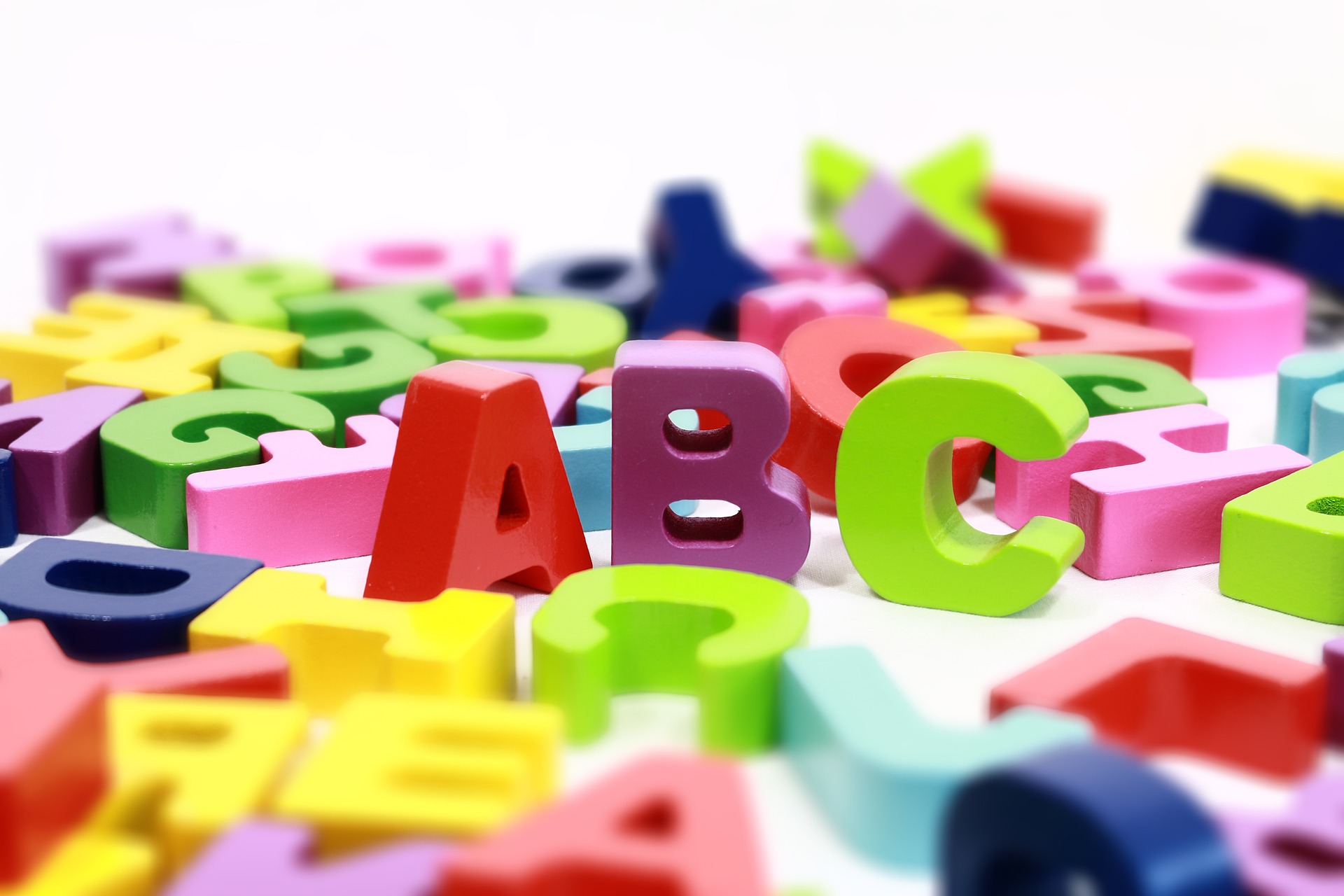
As new school and university semesters are beginning in many regions, thoughts turn to the importance of education and how effectively it prepares young people for working life. Education’s main purpose is to equip children and young adults with the skills they need to enter the labor market and build successful careers. Whether schooling is fulfilling this purpose suitably is the subject of much research and discussion.
Unfortunately, the empirical evidence shows that education is currently not adequately preparing young people for labor market success in many countries, causing the paradoxical issues of prevalent skills shortages alongside high levels of youth unemployment. This skills mismatch is a real challenge faced by many economies, as workers being in a job badly matched for their skill set has negative implications for individuals and economies.
Peter Sloane has written an article on this, titled Overeducation, skill mismatches, and labor market outcomes for college graduates , for IZA World of Labor. Sloane writes that “many college graduates are employed in jobs for which a degree is not required, and which the skills they learned in college are not being fully used.” This over-skilling causes low job satisfaction and lower productivity which makes it harmful to both employee welfare and employer interests. Having over-skilled graduates in non-graduate positions has repercussions for less-educated and lower-skilled segments of society who cannot then get the jobs suited to their skill-set.
The skills mismatch problem means that engaging employers in education policy is becoming a priority for governments and schools globally. Young people are entering the labor market with more years in education and more qualifications than ever before, but are finding it incredibly difficult to secure the jobs they want (or believe they are entitled to). Governments must support policies to bring the worlds of education and employment closer together. Urging educators and employers to work more closely will improve young people’s preparation for contemporary careers and help them to more successfully transition from school to work. Research from the UK’s Education and Employers Taskforce shows that successful policies in schools to prepare pupils for work include offering effective careers advice for the current/future job market, practical guidance on how to write a CV, how to apply for a job, and interview practice.
In developing countries, better information on university quality may reduce overeducation and skills mismatching. Gustavo Yamada argues, in his recently published IZA World of Labor article , that it is the rapid increase in the number of university graduates that may be causing the skills mismatch, particularly in developing countries with weak job markets. Yamada writes, “More university graduates could exacerbate unemployment, underemployment, and overeducation of professionals,” and goes on to suggest that, “policies should focus on the collection and dissemination of information on employability by career and institution.” This will ensure that young people are aware of the likely returns to their investment in higher education, before they undertake a university degree.
Another method for increasing the skilled workforce, which may prevent overeducation and skill mismatching, is shortening the number of years students spend in secondary school. In his IZA World of Labor article, The impacts of shortening secondary school duration, Stephan Thomsen writes that, “Shortening secondary school can boost the sustainability of tax and social security systems by enabling people to work longer. It can also ease the rising shortages of skilled workers through intergenerational transfers of know-how.” The twofold benefits of shortening secondary school duration (easing skill shortages, whilst also increasing the skilled workforce in aging societies) suggest that this could be a good problem-solving policy decision for the future. Although actions such as this may seem controversial, and may prove unpopular with parents who want their children to be as highly educated as possible, hard decisions need to be made by policymakers to ensure that today’s education systems are not failing the workers of tomorrow.
© Klaus F. Zimmermann
Read more of our Education and Human Capital articles.
Please note: We recognize that IZA World of Labor articles may prompt discussion and possibly controversy. Opinion pieces, such as the one above, capture ideas and debates concisely, and anchor them with real-world examples. Opinions stated here do not necessarily reflect those of the IZA.
How can we improve IZA World of Labor? Click here to take our 5-minute survey and enter a prize draw.
SPECIAL EDITION: South Budget slashed $2.8 million
- Close Menu Search
- pollsarchive
- Staff Story ideas

The Southerner

Award winning stories
- Top Stories
Why school doesn’t prepare us well enough for the real world
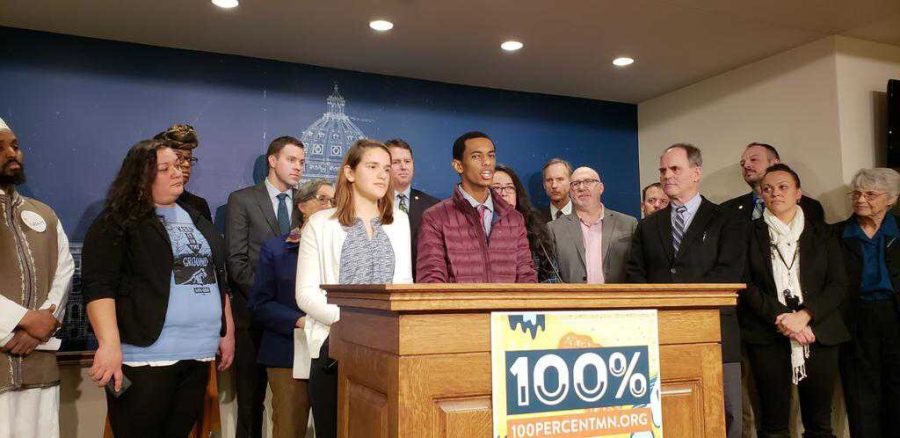
Larry Kraft
South junior Tiger Worku speaking in a political activity outside of school. Tiger is very involved in speaking and politics, saying “I’m a political enthusiast so I’d say that civic engagement is something that should be used in our schools more.” Civic engagement is a very useful skill that actually helps students find their passions and learn how they can become leaders of our society as adults. In order to give students these opportunities, schools should show the value of learning skills over content and give students more real-world learning opportunities. Photo courtesy of Larry Kraft.
Patrick Bruch , Staff Writer March 4, 2019
What we learn in school is different for all of us, but it is meant to provide skills and information that serves as a base for almost any career or life path. Although this is the idea behind education, the system doesn’t fully serve this purpose. It provides students with a concrete base of knowledge, but doesn’t really prepare them for meaningful work in the real world.
South junior Tiger Worku said, “Our education system wasn’t founded on teaching kids… how to be the next leaders of our society. It was founded to teach kids discipline and obedience.”
Many of the skills that we learn in school such as critical thinking, writing, speaking publicly, and the ability to discuss important topics in groups are very useful for careers in the real world, but much of the content we learn is often times not.
The skills we learn are useful for almost any career and in daily life. For example, you have to use writing skills when writing a formal email and when communicating professionally. Formal communication skills are also necessary for making calls, participating in meetings, conducting interviews, and much more in the working world. This is another use of the skills we gain through school.
Critical thinking is an especially important skill that schools teaches. It is applicable to almost all jobs, especially those that require problem solving. In addition, critical thinking is extremely useful when forming political and social opinions, which shape our world and laws. It challenges us to reexamine the lens through which we’ve grown up seeing the world by learning different perspectives and stepping out of societal norms. English teacher Mary Manor explained that “critical thinking [is] paramount — not just for “21st century jobs” but so that the workers of the world can consider their plight and begin to organize against the ruling classes… We are a country that can support billions, but we are instead pandering to billionaires. Only when we exercise our skills in analysis and synthesis — critical thinking — will we be able to come together as a nation and demand equity for all.”
However, in school we don’t always learn why these skills are important. We are mainly just given tasks in school without much explanation about how we will use them throughout the rest of our lives. For example, we learn how to do theoretical problems in math, but they often don’t connect to real life applications students care about.
While skills are useful, the content is often times not. For example, knowing the date of a certain historical event has no bearing on most career paths. While some historical knowledge is necessary for forming our ideas about the world, much of the specific information simply is not. Knowing the details and specifics of many subjects can be easily accessed online.
In order to learn more about real-world careers, students like Worku have taken their own initiative. “Politics is a field that I’ve been heavily interested in, and going to the capitol by myself, joining organizations by myself, learning tactics and strategies that will better benefit me years down the road, learning all that is something I had to do outside of school.” However experiences like Tiger’s are rare because it’s hard to find opportunities for impactful, real-world work and political involvement on one’s own.
Furthermore, schools do not make a strong enough attempt to cater to what students would like to explore, but instead give them a set of options to choose from that are geared towards economic industries such the STEM field. Many students are encouraged to be motivated by money and “successful careers,” rather than by trying to do something that would make the world a better place.
School also discourages students from finding their passions outside of school because of the pressure it puts on us. “I think the system is a little too strict and gets extremely stressful with the workload and lack of variation on the way we learn,” said junior Daisy Lavae. As she explained, almost every class structure is the same. We are given assignments, expected to learn certain information from these assignments, then we are asked to demonstrate our learning on tests. After that, we are given one of five letter grades to assess whether we learned what we were supposed to. So much pressure is put on our final grade and test scores that school can become a competition to be the best. The importance of learning skills for real life gets lost in this process.
This can become even more grueling and stressful because this style of learning doesn’t work for every student. And unfortunately, our education system revolves around grading because it is the only way to prepare students for college. Grades are a huge part of how colleges determine who to admit, and so the fear of getting bad grades can rule a student’s academic life. Many feel that if they don’t get good grades, they won’t be able to “succeed” because they can’t go to college. This is a huge weight to put on students, and can distract them from actually learning for the sake of learning, since they’re just focusing on what they have to do to get a certain grade.
“For me [it’s important to] know what I want to do, tailor my education to where it best fits me instead of just going through the school system like a robot,” Worku said. Yet within the current system, if students really want to follow their passions and get anywhere in the world they will have to put in more of time outside of school. This can create problems, as they may not have enough time for keeping their grades up, which may not actually help students truly learn but are necessary accolades to get into college. In order to improve students’ academic experience, schools need to emphasize learning skills and helping students find their passions through engaging in real-world, meaningful experiences.
- Daisy Lavae
- Tiger Worku

Senior Patrick Bruch is currently entering into his first year of writing for the Southerner. Senior year is an exciting thought for Bruch, who is excited...
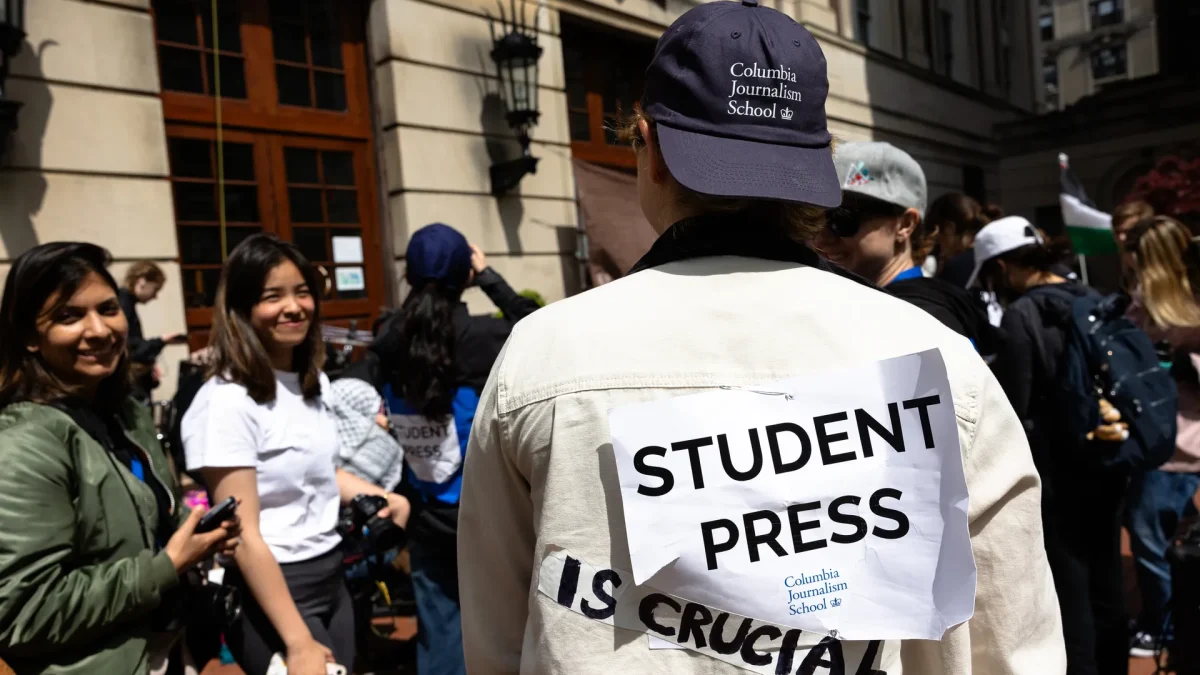
Alice Conry , Features Editor
May 16, 2024 • No Comments
While covering pro-Palestinian protests on the UCLA campus, 4 student journalists for the university's newspaper, The Daily Bruin, were verbally and physically assaulted by...

Aaron Bushnell: The Consequences of American Complacency
May 15, 2024

April 9, 2024
Students are the solution: a case for staying at South
Are you going to prom this year?
- I am not eligible for prom :( (42%, 71 Votes)
- Yes! (32%, 55 Votes)
- No. (26%, 44 Votes)
Total Voters: 170
- Polls Archive

2024 Budget Cuts
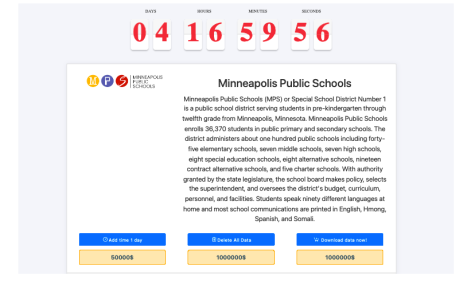
MPS falls victim to ransomware attack; sensitive information threatened to be released unless $1 million ransom is paid

Casual racism and the model minority myth: why schools must better serve Asian students
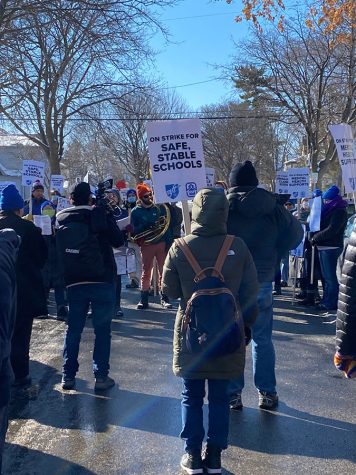
Minneapolis Public School staff on strike for second week
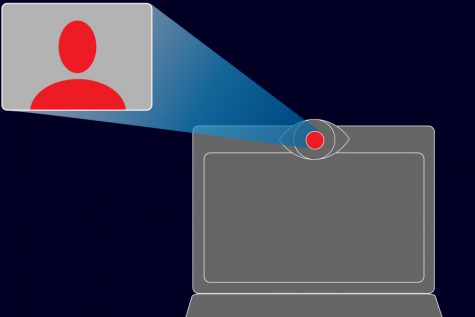
Gaggle: MPS’s new student surveillance software brings possible protection and danger

Lake Street Project responses to social injustice and the pandemic

MMIW Movement gets support from South community

Despite immense global impact, BTS doesn’t receive the recognition they deserve
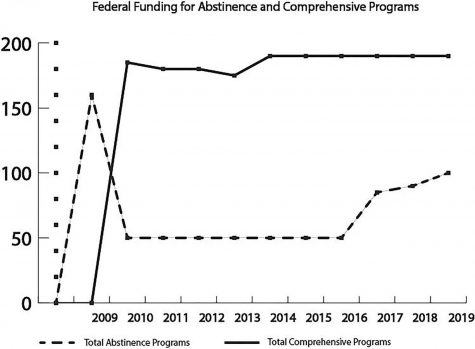
Grant funding threatens sex education resources
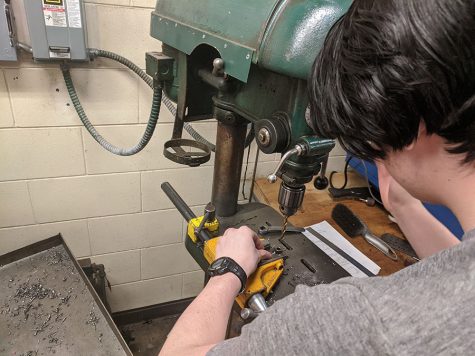
Insider trading; South’s neglect of technical careers
The South High School student news site
Comments (0)
Cancel reply
Your email address will not be published. Required fields are marked *

Des Sinkevich
May 02, 2023
Finishing high school is more than just a rite of passage, something that everyone has to do. It’s an important step to make sure that you’re set up for future success whether that means starting a career, getting a promotion at your job, going to college, or joining the military. But does high school really teach you what you need to know? Is what you learn relevant to real life? Here’s everything you need to know about how earning your high school diploma can prepare you to reach your goals!
OF JOBS REQUIRE HIGH SCHOOL DIPLOMA
Read more: 6 Advantages of Having a High School Diploma
“I dropped out of school and one thing that I always wanted to do was to graduate. I always dreamed of graduating and walking across the stage and throwing my cap up into the air.”
Kimberly Quinonez
Online High School Student
One of the most important skills you learn in high school is critical thinking. This involves analyzing information, evaluating arguments, and making sound judgments based on evidence. These skills are very important in the workplace, where managers need employees who can think critically and solve problems on their own. Critical thinking allows you to approach tasks with a logical and analytical mindset, which can help you excel in any career!
Alex Thome , Vice President of Penn Foster High School, explains:
“Online high school helps prepare students for a job by helping them develop real skills like time management and problem solving. In turn, students build confidence and the knowledge needed to be their best selves.”
Vice President, Penn Foster High School
High school is also an excellent time to learn time management skills. As a student, especially an online student, you’re responsible for planning your time effectively to make sure you study, take exams, submit assignments, and graduate.
Time management is vital in the workforce, where employers expect employees to be able to prioritize tasks, meet deadlines, and manage their workload. Being able to manage your time effectively can help you stand out as a productive and reliable employee! Besides that, having strong time management skills can help you stay organized and on top of things in your everyday life.
High school also helps you develop your written and verbal communication skills. While you may not enjoy writing that essay or giving a presentation, these tasks help you learn how to communicate your thoughts and ideas to others. In the workforce, effective communication plays a huge part in determining whether or not you’ll be successful on the job, and employers want employees who can communicate clearly and confidently. Strong communication skills can also help you build better relationships with the people in your life!
High School English instructor Shawn Cherinchak explains, “Writing is definitely an important skill to have. You need it for many things in life. If you’re applying for a job, you’ll need to write a cover letter. You’ll have to prepare a resume. A lot of times your boss will ask you to prepare something [for the job], so you’ll have to have some skills with writing. And if you want to further your education in college, you’ll need to know how to write for your professors.”
With online high school programs like Penn Foster, your classes are all self-paced and there are no set deadlines. There are also no scheduled classes with teachers; you are responsible for learning on your own. Through being responsible for studying and learning on your own, you can become comfortable with working independently. This skill is beneficial to have for any career you’d like to pursue because you won’t always have someone telling you what tasks you need to complete when.
Read more: How High School Prepares You for Success
Yes, high school is important! Or at least, getting a high school diploma or GED is important to making sure you don’t miss out on opportunities like better jobs, higher salaries, and promotions. While there are still some jobs that don’t require a high school diploma, you’re not as likely to be able to get promoted to more advanced roles unless you do have your diploma.
Even more important than job opportunities? How much you can earn! Someone who finished high school can earn around $7,000 more per year than someone who didn’t.
Yes, grades do really matter in high school, but how much they matter really depends on what you want to do after you graduate. In order to get to graduation, you do have to make sure your grades are at least passing. A passing grade can vary by the school, but most high schools consider a 65, or a D, to be just passing. Anything less than that and you may not pass a class or have to repeat the class.
Outside of making sure you pass your classes, your grades likely won’t matter as much to potential employers if you’re looking to get a job right out of high school. Usually, they’ll just look to make sure you graduated and that’s it.
However, if you want to go to college, then your grades matter a little more.
Read more: Penn Foster Exams and Grading Explained
Yes, colleges care about high school grades. When you’re applying to colleges, you’re competing with tons of other students who want to enroll there. Schools want to make sure that the people they accept are ready for college-level coursework and that they are able to succeed in harder classes. That often means looking for applicants who have higher grades. This doesn’t mean that you need a perfect GPA to be accepted to college; different colleges have different standards for who they accept. However, it does mean that you want to make sure you do your best and try to get decent grades.
Read more: How to Apply to College After High School
Yes, high school can help you prepare for college ! The skills you learn in your high school classes, like writing essays, are the same skills you’ll use in college. For the most part, what you learn is basically a stepping stone for what you can expect when you go to college. And, if you know you definitely want to go to college after you graduate, you can even start taking some more advanced courses that can help you better prepare for what to expect. For example, Penn Foster’s High School Diploma with Early College Program is designed to help you prepare to take the next steps toward furthering your education by giving you the opportunity to take the more advanced classes that many colleges look for on applicants’ transcripts.
Read more: How to Prepare for College in High School (Checklist)
Yes, going to online high school is definitely worth it. Whether you’re a traditional student looking to finish high school your way or you’re an adult who needs to get their diploma for a job, online high school has a lot of benefits. With Penn Foster High School, you can study at the pace that works best for you, around your schedule. There are no scheduled class times or exam due dates, so you can study and take tests around your work schedule, your life, or your hobbies. And, when you graduate, you’ve earned a regionally and nationally accredited high school diploma that can help you take the next steps toward the job you want, college, or the military.
Dr. Andrew Shean , Chief Learning Officer, explains that online high school can be a very viable option for those students who don’t want to or can’t attend their local high school.
“[Online school offers] the ability to be flexible and self-paced, and also have high touch support, curriculum that’s engaging, and you don’t have the unnecessary nonsense that happens in high school.”
To learn more about how Penn Foster works or to start earning your diploma today, reach out to our Admissions Specialists at 1-888-427-6500 !
Read more: Going Back to School as an Adult

10 Skilled Trades Jobs In Demand for 2024
Jan 05, 2023

Which Medical Coding & Billing Certification Exam Should You Take – the CBCS or CPC?
Penn Foster
Sep 27, 2022
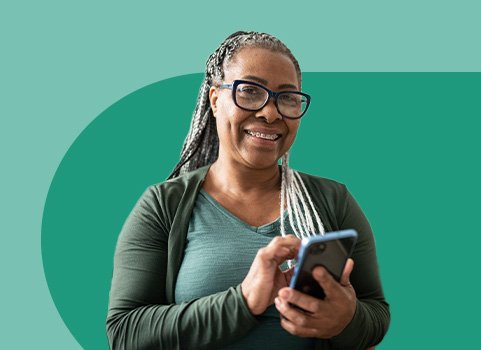
Going Back to School as an Adult (FAQs)
Jun 09, 2022
11 min read
- Grades 6-12
- School Leaders
NEW: Classroom Clean-Up/Set-Up Email Course! 🧽
The Big List of Essay Topics for High School (120+ Ideas!)
Ideas to inspire every young writer!

High school students generally do a lot of writing, learning to use language clearly, concisely, and persuasively. When it’s time to choose an essay topic, though, it’s easy to come up blank. If that’s the case, check out this huge round-up of essay topics for high school. You’ll find choices for every subject and writing style.
- Argumentative Essay Topics
- Cause-and-Effect Essay Topics
- Compare-Contrast Essay Topics
- Descriptive Essay Topics
- Expository and Informative Essay Topics
- Humorous Essay Topics
Literary Essay Topics
- Narrative and Personal Essay Topics
- Personal Essay Topics
- Persuasive Essay Topics
Research Essay Topics
Argumentative essay topics for high school.
When writing an argumentative essay, remember to do the research and lay out the facts clearly. Your goal is not necessarily to persuade someone to agree with you, but to encourage your reader to accept your point of view as valid. Here are some possible argumentative topics to try. ( Here are 100 more compelling argumentative essay topics. )
- The most important challenge our country is currently facing is … (e.g., immigration, gun control, economy)
- The government should provide free internet access for every citizen.
- All drugs should be legalized, regulated, and taxed.
- Vaping is less harmful than smoking tobacco.
- The best country in the world is …
- Parents should be punished for their minor children’s crimes.
- Should all students have the ability to attend college for free?
- Should physical education be part of the standard high school curriculum?

WeAreTeachers
- Schools should require recommended vaccines for all students, with very limited exceptions.
- Is it acceptable to use animals for experiments and research?
- Does social media do more harm than good?
- Capital punishment does/does not deter crime.
- What one class should all high schools students be required to take and pass in order to graduate?
- Do we really learn anything from history, or does it just repeat itself over and over?
- Are men and women treated equally?
Cause-and-Effect Essay Topics for High School
A cause-and-effect essay is a type of argumentative essay. Your goal is to show how one specific thing directly influences another specific thing. You’ll likely need to do some research to make your point. Here are some ideas for cause-and-effect essays. ( Get a big list of 100 cause-and-effect essay topics here. )
- Humans are causing accelerated climate change.
- Fast-food restaurants have made human health worse over the decades.
- What caused World War II? (Choose any conflict for this one.)
- Describe the effects social media has on young adults.

- How does playing sports affect people?
- What are the effects of loving to read?
- Being an only/oldest/youngest/middle child makes you …
- What effect does violence in movies or video games have on kids?
- Traveling to new places opens people’s minds to new ideas.
- Racism is caused by …
Compare-Contrast Essay Topics for High School
As the name indicates, in compare-and-contrast essays, writers show the similarities and differences between two things. They combine descriptive writing with analysis, making connections and showing dissimilarities. The following ideas work well for compare-contrast essays. ( Find 80+ compare-contrast essay topics for all ages here. )
- Public and private schools
- Capitalism vs. communism
- Monarchy or democracy
- Dogs vs. cats as pets

- Paper books or e-books
- Two political candidates in a current race
- Going to college vs. starting work full-time
- Working your way through college as you go or taking out student loans
- iPhone or Android
- Instagram vs. Twitter (or choose any other two social media platforms)
Descriptive Essay Topics for High School
Bring on the adjectives! Descriptive writing is all about creating a rich picture for the reader. Take readers on a journey to far-off places, help them understand an experience, or introduce them to a new person. Remember: Show, don’t tell. These topics make excellent descriptive essays.
- Who is the funniest person you know?
- What is your happiest memory?
- Tell about the most inspirational person in your life.
- Write about your favorite place.
- When you were little, what was your favorite thing to do?
- Choose a piece of art or music and explain how it makes you feel.
- What is your earliest memory?

- What’s the best/worst vacation you’ve ever taken?
- Describe your favorite pet.
- What is the most important item in the world to you?
- Give a tour of your bedroom (or another favorite room in your home).
- Describe yourself to someone who has never met you.
- Lay out your perfect day from start to finish.
- Explain what it’s like to move to a new town or start a new school.
- Tell what it would be like to live on the moon.
Expository and Informative Essay Topics for High School
Expository essays set out clear explanations of a particular topic. You might be defining a word or phrase or explaining how something works. Expository or informative essays are based on facts, and while you might explore different points of view, you won’t necessarily say which one is “better” or “right.” Remember: Expository essays educate the reader. Here are some expository and informative essay topics to explore. ( See 70+ expository and informative essay topics here. )
- What makes a good leader?
- Explain why a given school subject (math, history, science, etc.) is important for students to learn.
- What is the “glass ceiling” and how does it affect society?
- Describe how the internet changed the world.
- What does it mean to be a good teacher?

- Explain how we could colonize the moon or another planet.
- Discuss why mental health is just as important as physical health.
- Describe a healthy lifestyle for a teenager.
- Choose an American president and explain how their time in office affected the country.
- What does “financial responsibility” mean?
Humorous Essay Topics for High School
Humorous essays can take on any form, like narrative, persuasive, or expository. You might employ sarcasm or satire, or simply tell a story about a funny person or event. Even though these essay topics are lighthearted, they still take some skill to tackle well. Give these ideas a try.
- What would happen if cats (or any other animal) ruled the world?
- What do newborn babies wish their parents knew?
- Explain the best ways to be annoying on social media.
- Invent a wacky new sport, explain the rules, and describe a game or match.

- Imagine a discussion between two historic figures from very different times, like Cleopatra and Queen Elizabeth I.
- Retell a familiar story in tweets or other social media posts.
- Describe present-day Earth from an alien’s point of view.
- Choose a fictional character and explain why they should be the next president.
- Describe a day when kids are in charge of everything, at school and at home.
Literary essays analyze a piece of writing, like a book or a play. In high school, students usually write literary essays about the works they study in class. These literary essay topic ideas focus on books students often read in high school, but many of them can be tweaked to fit other works as well.
- Discuss the portrayal of women in Shakespeare’s Othello .
- Explore the symbolism used in The Scarlet Letter .
- Explain the importance of dreams in Of Mice and Men .
- Compare and contrast the romantic relationships in Pride and Prejudice .

- Dissect the allegory of Animal Farm and its relation to contemporary events.
- Interpret the author’s take on society and class structure in The Great Gatsby .
- Explore the relationship between Hamlet and Ophelia.
- Discuss whether Shakespeare’s portrayal of young love in Romeo and Juliet is accurate.
- Explain the imagery used in Beowulf .
Narrative and Personal Essay Topics for High School
Think of a narrative essay like telling a story. Use some of the same techniques that you would for a descriptive essay, but be sure you have a beginning, middle, and end. A narrative essay doesn’t necessarily need to be personal, but they often are. Take inspiration from these narrative and personal essay topics.
- Describe a performance or sporting event you took part in.
- Explain the process of cooking and eating your favorite meal.
- Write about meeting your best friend for the first time and how your relationship developed.
- Tell about learning to ride a bike or drive a car.
- Describe a time in your life when you’ve been scared.

- Share the most embarrassing thing that ever happened to you.
- Tell about a time when you overcame a big challenge.
- Tell the story of how you learned an important life lesson.
- Describe a time when you or someone you know experienced prejudice or oppression.
- Explain a family tradition, how it developed, and its importance today.
- What is your favorite holiday? How does your family celebrate it?
- Retell a familiar story from the point of view of a different character.
- Describe a time when you had to make a difficult decision.
- Tell about your proudest moment.
Persuasive Essay Topics for High School
Persuasive essays are similar to argumentative , but they rely less on facts and more on emotion to sway the reader. It’s important to know your audience, so you can anticipate any counterarguments they might make and try to overcome them. Try these topics to persuade someone to come around to your point of view. ( Discover 60 more intriguing persuasive essay topics here. )
- Do you think homework should be required, optional, or not given at all?
- Everyone should be vegetarian or vegan.
- What animal makes the best pet?
- Visit an animal shelter, choose an animal that needs a home, and write an essay persuading someone to adopt that animal.
- Who is the world’s best athlete, present or past?
- Should little kids be allowed to play competitive sports?
- Are professional athletes/musicians/actors overpaid?
- The best music genre is …

- Is democracy the best form of government?
- Is capitalism the best form of economy?
- Students should/should not be able to use their phones during the school day.
- Should schools have dress codes?
- If I could change one school rule, it would be …
- Is year-round school a good idea?
A research essay is a classic high school assignment. These papers require deep research into primary source documents, with lots of supporting facts and evidence that’s properly cited. Research essays can be in any of the styles shown above. Here are some possible topics, across a variety of subjects.
- Which country’s style of government is best for the people who live there?
- Choose a country and analyze its development from founding to present day.
- Describe the causes and effects of a specific war.
- Formulate an ideal economic plan for our country.
- What scientific discovery has had the biggest impact on life today?

- Analyze the way mental health is viewed and treated in this country.
- Explore the ways systemic racism impacts people in all walks of life.
- Defend the importance of teaching music and the arts in public schools.
- Choose one animal from the endangered species list, and propose a realistic plan to protect it.
What are some of your favorite essay topics for high school? Come share your prompts on the WeAreTeachers HELPLINE group on Facebook .
Plus, check out the ultimate guide to student writing contests .
We Are Teachers
You Might Also Like

100 Thought-Provoking Argumentative Writing Prompts for Kids and Teens
Practice making well-reasoned arguments using research and facts. Continue Reading
Copyright © 2024. All rights reserved. 5335 Gate Parkway, Jacksonville, FL 32256
Explore how Microsoft's partnership with Khan Academy is enhancing the future of education with AI innovation and tools for teachers >
- AI in education
- Published Apr 25, 2024
Explore insights from the AI in Education Report

- Content Type
- Higher education
- Education decision makers
The swift rise of generative AI is reshaping how schools approach creation, problem-solving, learning, and communication. Your schools are in a pivotal moment when critical thinking and metacognitive skills are more important than ever as new technology develops.
As we continue to learn, Microsoft believes it is important to share our early findings from our AI in Education Report . In this report, we highlight insights from our research, as well as research from partner organizations.
Key takeaways from the AI in Education Report include:
- Start AI conversations today. There is an urgent need to communicate clearly and openly about AI, increase AI literacy, and create usage guidelines at educational organizations.
- Learn how AI can help. There is a clear opportunity for AI to help educators and administrators lighten workloads, boost productivity, and improve efficiency.
- Explore new ways to learn with AI. Early studies demonstrate the potential of AI to improve educational experiences and learning outcomes.
- Prepare for the workplace of the future. Students need to build people skills and technical capacity to prepare for a world transformed by AI.
Explore the AI in Education Report for resources and recommendations that help represent the opportunities that come with this unique moment.
Start AI conversations today
When you’re getting started with using AI tools, it’s common to begin with figuring out ways to make everyday tasks easier. In education, AI also brings opportunities to provide actionable insights, improve learning outcomes, and make more time for human connection and collaboration. But there are also challenges to navigate and overcome to realize that potential. To better understand the needs and opportunities around AI in education, Microsoft surveyed educators, academic and IT leaders, and students from K-12 schools and higher education institutions about their perceptions, familiarity, uses, and concerns around AI tools.
Sample findings from the survey include:
- 47% of education leaders use AI every day
- 68% of all educators have used AI at least once or twice
- 62% of all students have used AI at least once or twice
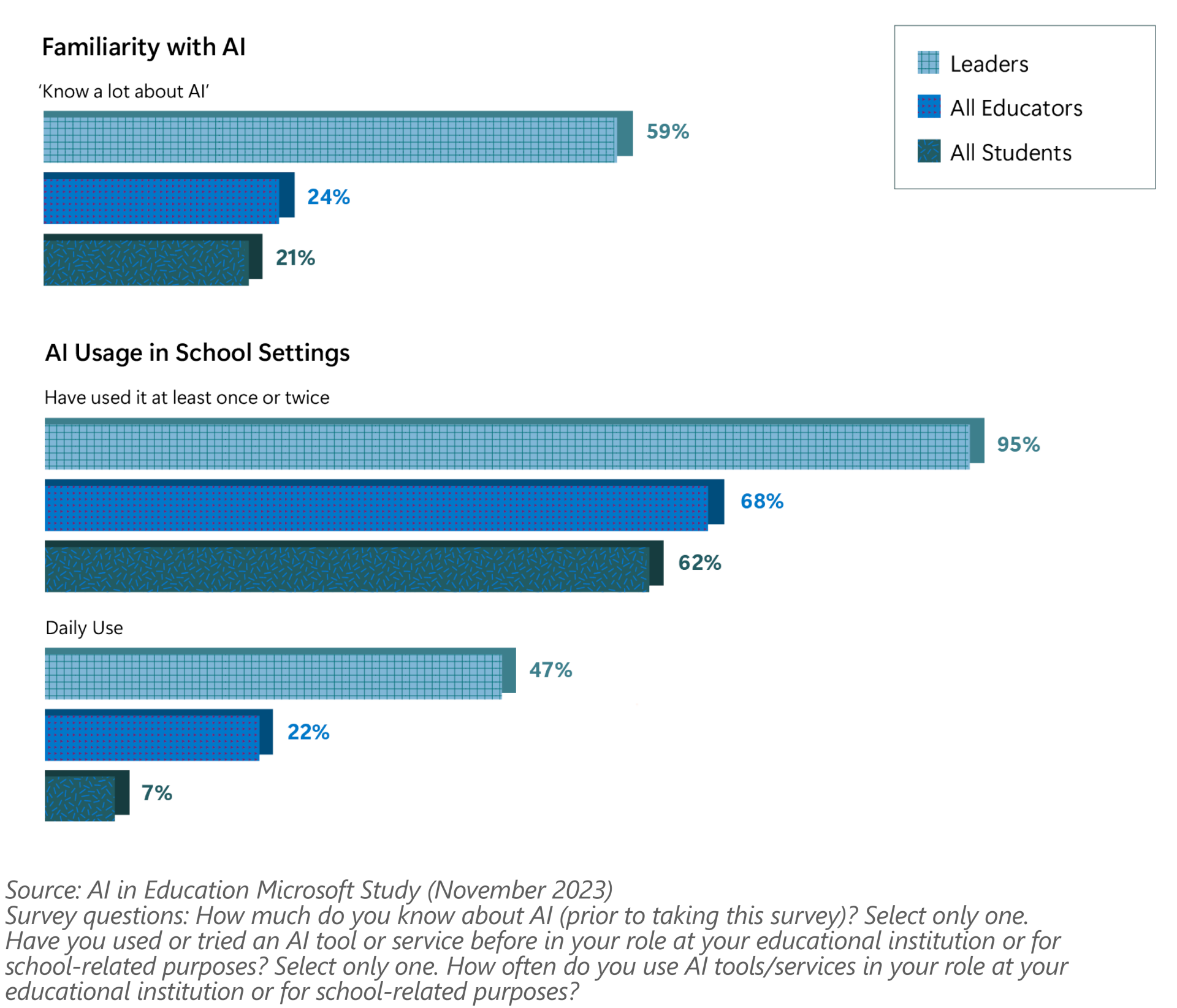
Survey results from the AI in Education Report show a comparison of the familiarity and usage of AI between leaders, all educators, and students in school settings. It highlights the significant difference in daily use of AI among these groups.
Despite generally low familiarity with AI, especially among students, it’s noteworthy that respondents from each group are using AI. This widespread adoption underscores the need for clear guidance and practical frameworks to help navigate the complexities of AI in education. Concerns about cheating are prevalent across all groups, including students, further highlighting the importance of establishing transparent and consistent guidance.
Take these next steps to start AI conversations at your school or institution:
- Request that your school or district leaders create clear guidelines and policies and provide professional learning opportunities. Consider sharing the TeachAI Toolkit as a resource.
- Help students learn how to use AI responsibly without compromising their academic integrity by setting clear expectations.
Common ways that generative AI tools are used in schools
AI can enable personalized learning, free up time for educators to focus on what matters most, and help address issues of equity and accessibility . It can also improve operational efficiency, bringing much-needed support to overburdened administrators and IT teams. There is a clear opportunity for AI to help educators and administrators lighten workloads, boost productivity, and improve efficiency.
Among respondents who report using AI, some of the most common tasks they use it for include:
- Leaders use AI tools mostly to improve efficiency of operational and administrative processes, improve access to resources, support communication with students, and identify opportunities for student improvement.
- Educators use AI tools mainly to create or update lesson plans, brainstorm new ideas, simplify complex topics, free up their time, and differentiate instruction to address students’ needs.
- Students use AI tools mostly to summarize information, help them brainstorm, get answers or information quickly, get initial feedback, and improve their writing skills.
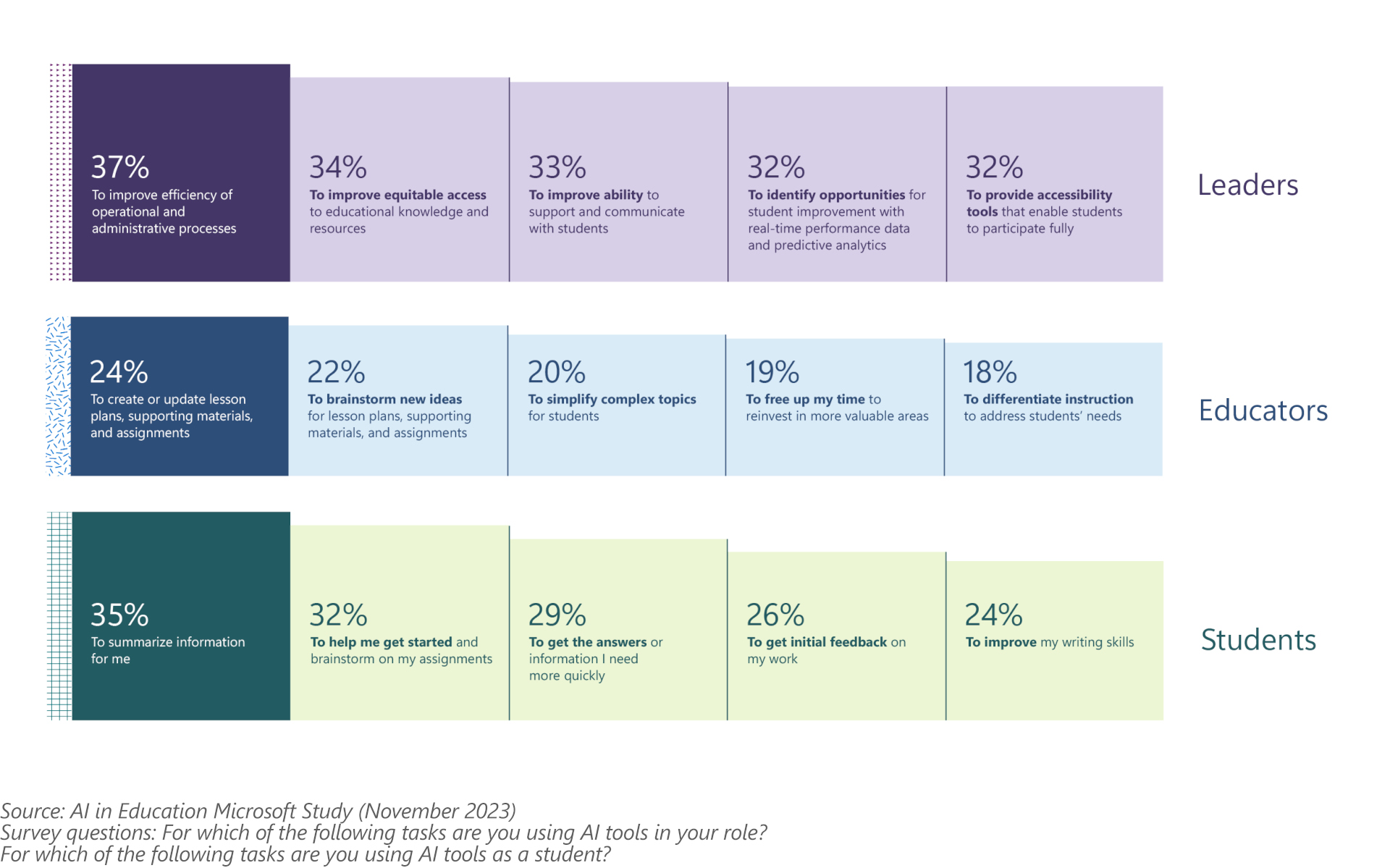
Survey results from the AI in Education Report show the widespread use and potential of AI in enhancing learning experiences and outcomes for different roles.
Learn how AI can help your school
Each month, the heaviest Microsoft 365 Education users receive hundreds of emails and chat messages to get things done. AI can enable greater productivity in tasks like lesson planning and curriculum development, which make up 45% of teachers’ responsibilities. That frees up time for educators to do the things only humans can do—like connect with students.
Educational institutions are moving fast when it comes to AI, and they’re seeing significant returns on their investment. However, an IDC study on the opportunity of AI in education found that education leaders feel less prepared for AI-driven change than their peers in other industries.
Education organizations can take these steps to increase preparedness and develop a strategy:
- Establish a guiding committee that defines and steers AI strategy, responsible use policies, governance models, and priorities.
- Prepare for change by building a centralized, cross-functional AI team that can connect AI initiatives to the organization’s existing priorities and create training opportunities.
- Prioritize high-value, low-complexity AI use cases. Start small, collect, and respond to feedback, and plan for scalable and impactful solutions.
To hear more IDC insights from a Microsoft sponsored study, explore the following resources:
- Read Education’s AI Journey Behind the Headlines
- Watch AI’s Impact in Education Extends Far Beyond the Classroom
Explore new ways to learn with AI
Students and educators alike have already made a discovery about the benefits of using generative AI in the classroom, particularly when used as a personalized academic coach that encourages learning and engagement rather than simply giving responses.
Explore these key takeaways from early studies about the potential impact of generative AI on learning:
- In December 2023, Microsoft Research and Harsh Kumar of the University of Toronto discovered that AI-generated explanations enhanced learning compared to solely viewing correct answers. The advantages were most significant for students who first attempted problems independently before receiving assistance.
- A 2023 study by Harvard University and Yale University professors found that AI chatbots can give students in large classes an experience that approximates an ideal one-to-one relationship between educator and student.
One student shared that it “felt like having a personal tutor…I love how AI bots will answer questions without ego and without judgment, generally entertaining even the stupidest of questions without treating them like they’re stupid.”
Take these next steps to explore how AI can support student learning:
- Model and encourage a growth mindset that includes learning, iteration, and curiosity.
- Learn from others and explore educational AI resources.
- Be intentional in your design of new AI experiences. What is your goal and how might AI help you achieve it?
Prepare for the workplace of the future
Workplaces, like classrooms, have been altered by the rise of generative AI tools. As a result, the skills that students need to learn have changed, too.
Important findings about the evolution of workplace skills include that 82% of leaders surveyed for Microsoft’s 2023 Work Trend Index say employees will need new skills to be prepared for the growth of AI. And learning to work alongside AI won’t just be about building technical capacity. It will be necessary to prioritize people skills, and new analytical, emotional, and critical thinking skills. According to the 2023 LinkedIn Future of Work Report , 92% of U.S. executives agree that people skills are more important than ever.
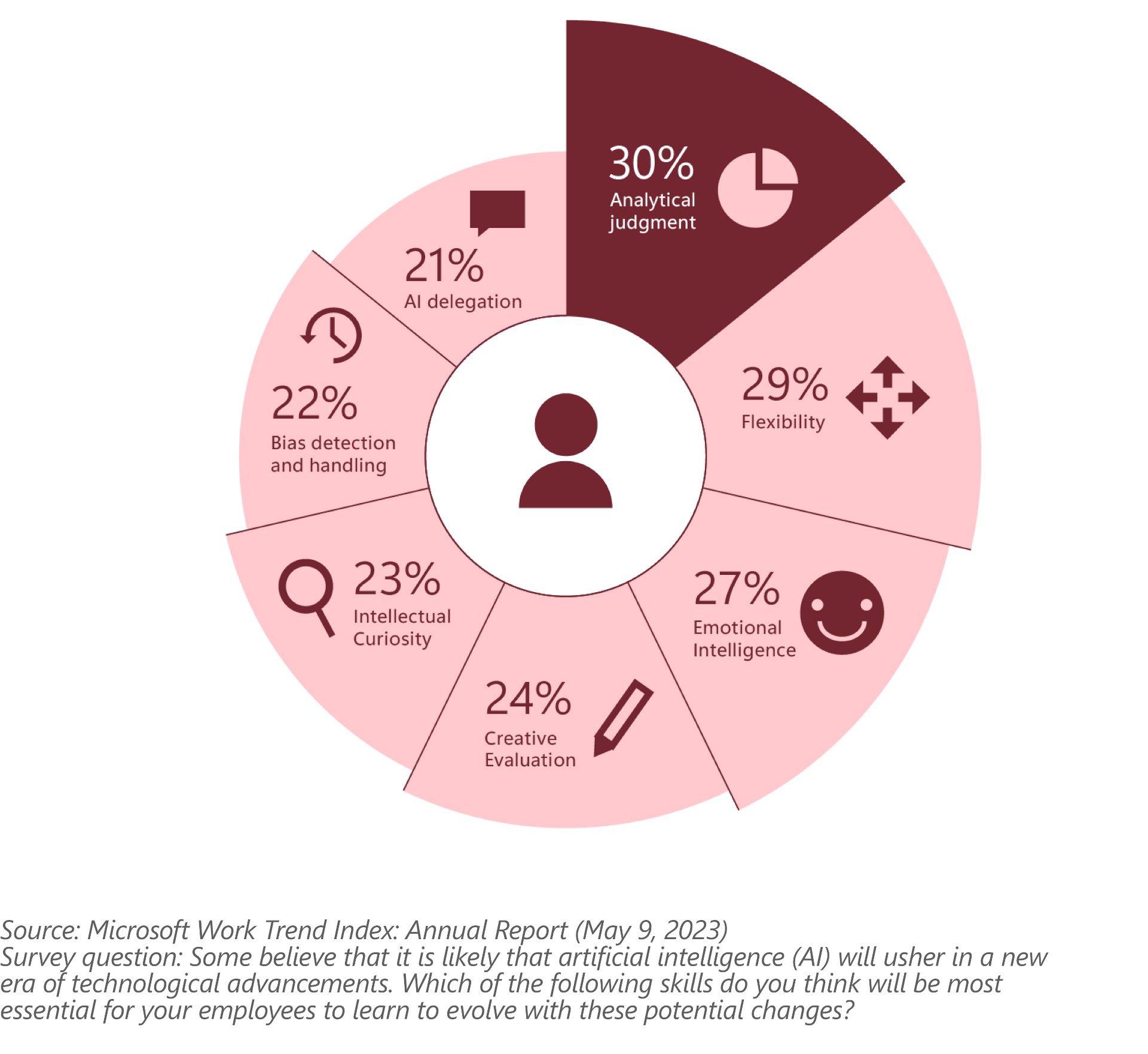
Survey results from Microsoft’s 2023 Work Trend Index show that skills like analytical judgment, flexibility, emotional intelligence, creative evaluation, intellectual curiosity, bias detection and handling, and AI delegation will be essential.
Take these steps to help prepare your students for future-ready skills:
- Teach students metacognitive and human-centered skills including the ability to analyze, understand, and control their own thought processes. You can start by asking students why they agree or disagree with AI-generated content.
- Model using AI tools to spark discussion and explore alternative views instead of only providing answers.
The rapid ascent of generative AI is revolutionizing how schools foster creativity, approach challenges, and enhance learning . Discover insights, resources, and recommendations in our AI in Education Report to seize the potential of this transformative era.
AI in education brings opportunity to life
Watch Reimagine Education
Connect with us on social

Subscribe to our newsletter
Stay up to date with monthly newsletters from Microsoft Education.
School stories
Get inspired by stories from Microsoft Education customers.
Microsoft Learn Educator Center
Expand possibilities with educator training and professional development resources.
Contact sales
Connect with a Microsoft Education sales specialist to explore solutions for your school.
Discover a collection of resources to support a variety of educational topics.
COVID-19: Long-term effects
Some people continue to experience health problems long after having COVID-19. Understand the possible symptoms and risk factors for post-COVID-19 syndrome.
Most people who get coronavirus disease 2019 (COVID-19) recover within a few weeks. But some people — even those who had mild versions of the disease — might have symptoms that last a long time afterward. These ongoing health problems are sometimes called post- COVID-19 syndrome, post- COVID conditions, long COVID-19 , long-haul COVID-19 , and post acute sequelae of SARS COV-2 infection (PASC).
What is post-COVID-19 syndrome and how common is it?
Post- COVID-19 syndrome involves a variety of new, returning or ongoing symptoms that people experience more than four weeks after getting COVID-19 . In some people, post- COVID-19 syndrome lasts months or years or causes disability.
Research suggests that between one month and one year after having COVID-19 , 1 in 5 people ages 18 to 64 has at least one medical condition that might be due to COVID-19 . Among people age 65 and older, 1 in 4 has at least one medical condition that might be due to COVID-19 .
What are the symptoms of post-COVID-19 syndrome?
The most commonly reported symptoms of post- COVID-19 syndrome include:
- Symptoms that get worse after physical or mental effort
- Lung (respiratory) symptoms, including difficulty breathing or shortness of breath and cough
Other possible symptoms include:
- Neurological symptoms or mental health conditions, including difficulty thinking or concentrating, headache, sleep problems, dizziness when you stand, pins-and-needles feeling, loss of smell or taste, and depression or anxiety
- Joint or muscle pain
- Heart symptoms or conditions, including chest pain and fast or pounding heartbeat
- Digestive symptoms, including diarrhea and stomach pain
- Blood clots and blood vessel (vascular) issues, including a blood clot that travels to the lungs from deep veins in the legs and blocks blood flow to the lungs (pulmonary embolism)
- Other symptoms, such as a rash and changes in the menstrual cycle
Keep in mind that it can be hard to tell if you are having symptoms due to COVID-19 or another cause, such as a preexisting medical condition.
It's also not clear if post- COVID-19 syndrome is new and unique to COVID-19 . Some symptoms are similar to those caused by chronic fatigue syndrome and other chronic illnesses that develop after infections. Chronic fatigue syndrome involves extreme fatigue that worsens with physical or mental activity, but doesn't improve with rest.
Why does COVID-19 cause ongoing health problems?
Organ damage could play a role. People who had severe illness with COVID-19 might experience organ damage affecting the heart, kidneys, skin and brain. Inflammation and problems with the immune system can also happen. It isn't clear how long these effects might last. The effects also could lead to the development of new conditions, such as diabetes or a heart or nervous system condition.
The experience of having severe COVID-19 might be another factor. People with severe symptoms of COVID-19 often need to be treated in a hospital intensive care unit. This can result in extreme weakness and post-traumatic stress disorder, a mental health condition triggered by a terrifying event.
What are the risk factors for post-COVID-19 syndrome?
You might be more likely to have post- COVID-19 syndrome if:
- You had severe illness with COVID-19 , especially if you were hospitalized or needed intensive care.
- You had certain medical conditions before getting the COVID-19 virus.
- You had a condition affecting your organs and tissues (multisystem inflammatory syndrome) while sick with COVID-19 or afterward.
Post- COVID-19 syndrome also appears to be more common in adults than in children and teens. However, anyone who gets COVID-19 can have long-term effects, including people with no symptoms or mild illness with COVID-19 .
What should you do if you have post-COVID-19 syndrome symptoms?
If you're having symptoms of post- COVID-19 syndrome, talk to your health care provider. To prepare for your appointment, write down:
- When your symptoms started
- What makes your symptoms worse
- How often you experience symptoms
- How your symptoms affect your activities
Your health care provider might do lab tests, such as a complete blood count or liver function test. You might have other tests or procedures, such as chest X-rays, based on your symptoms. The information you provide and any test results will help your health care provider come up with a treatment plan.
In addition, you might benefit from connecting with others in a support group and sharing resources.
- Long COVID or post-COVID conditions. Centers for Disease Control and Prevention. https://www.cdc.gov/coronavirus/2019-ncov/long-term-effects.html. Accessed May 6, 2022.
- Post-COVID conditions: Overview for healthcare providers. Centers for Disease Control and Prevention. https://www.cdc.gov/coronavirus/2019-ncov/hcp/clinical-care/post-covid-conditions.html. Accessed May 6, 2022.
- Mikkelsen ME, et al. COVID-19: Evaluation and management of adults following acute viral illness. https://www.uptodate.com/contents/search. Accessed May 6, 2022.
- Saeed S, et al. Coronavirus disease 2019 and cardiovascular complications: Focused clinical review. Journal of Hypertension. 2021; doi:10.1097/HJH.0000000000002819.
- AskMayoExpert. Post-COVID-19 syndrome. Mayo Clinic; 2022.
- Multisystem inflammatory syndrome (MIS). Centers for Disease Control and Prevention. https://www.cdc.gov/mis/index.html. Accessed May 24, 2022.
- Patient tips: Healthcare provider appointments for post-COVID conditions. https://www.cdc.gov/coronavirus/2019-ncov/long-term-effects/post-covid-appointment/index.html. Accessed May 24, 2022.
- Bull-Otterson L, et al. Post-COVID conditions among adult COVID-19 survivors aged 18-64 and ≥ 65 years — United States, March 2020 — November 2021. MMWR Morbidity and Mortality Weekly Report. 2022; doi:10.15585/mmwr.mm7121e1.
Products and Services
- A Book: Endemic - A Post-Pandemic Playbook
- Begin Exploring Women's Health Solutions at Mayo Clinic Store
- A Book: Future Care
- Antibiotics: Are you misusing them?
- COVID-19 and vitamin D
- Convalescent plasma therapy
- Coronavirus disease 2019 (COVID-19)
- COVID-19: How can I protect myself?
- Herd immunity and respiratory illness
- COVID-19 and pets
- COVID-19 and your mental health
- COVID-19 antibody testing
- COVID-19, cold, allergies and the flu
- COVID-19 tests
- COVID-19 drugs: Are there any that work?
- COVID-19 in babies and children
- Coronavirus infection by race
- COVID-19 travel advice
- COVID-19 vaccine: Should I reschedule my mammogram?
- COVID-19 vaccines for kids: What you need to know
- COVID-19 vaccines
- COVID-19 variant
- COVID-19 vs. flu: Similarities and differences
- COVID-19: Who's at higher risk of serious symptoms?
- Debunking coronavirus myths
- Different COVID-19 vaccines
- Extracorporeal membrane oxygenation (ECMO)
- Fever: First aid
- Fever treatment: Quick guide to treating a fever
- Fight coronavirus (COVID-19) transmission at home
- Honey: An effective cough remedy?
- How do COVID-19 antibody tests differ from diagnostic tests?
- How to measure your respiratory rate
- How to take your pulse
- How to take your temperature
- How well do face masks protect against COVID-19?
- Is hydroxychloroquine a treatment for COVID-19?
- Loss of smell
- Mayo Clinic Minute: You're washing your hands all wrong
- Mayo Clinic Minute: How dirty are common surfaces?
- Multisystem inflammatory syndrome in children (MIS-C)
- Nausea and vomiting
- Pregnancy and COVID-19
- Safe outdoor activities during the COVID-19 pandemic
- Safety tips for attending school during COVID-19
- Sex and COVID-19
- Shortness of breath
- Thermometers: Understand the options
- Treating COVID-19 at home
- Unusual symptoms of coronavirus
- Vaccine guidance from Mayo Clinic
- Watery eyes
Related information
- Post-COVID Recovery & COVID-19 Support Group - Related information Post-COVID Recovery & COVID-19 Support Group
- Rehabilitation after COVID-19 - Related information Rehabilitation after COVID-19
- Post-COVID-19 syndrome could be a long haul (podcast) - Related information Post-COVID-19 syndrome could be a long haul (podcast)
- COVID-19 Coronavirus Long-term effects
We’re transforming healthcare
Make a gift now and help create new and better solutions for more than 1.3 million patients who turn to Mayo Clinic each year.
Applying to Medical School with AMCAS®
New section.
The American Medical College Application Service® (AMCAS®) is the AAMC's centralized medical school application processing service. Most U.S. medical schools use the AMCAS program as the primary application method for their first-year entering classes.
- AMCAS® Sign In

The AMCAS applicant guide outlines the current AMCAS application process, policies, and procedures. This comprehensive resource helps you understand how to complete your AMCAS application.
The American Medical College Application Service® (AMCAS®) is the AAMC's centralized medical school application processing service.
These pages outline the sections of the AMCAS® application, including the Choose Your Medical School Tool. Full details can be found in the AMCAS Applicant Guide . Visit the FAQ page for answers to your questions.
Use the AAMC American Medical College Application Service® (AMCAS®) Medical Schools and Deadlines search tool to find application deadlines at participating regular MD programs.
Frequently asked questions (FAQs) regarding the American Medical College Application Service® (AMCAS®) application process. For more detailed FAQs on the AMCAS Letter of Evaluation process including information for letter authors please visit the AMCAS How to Apply section of the site.
The AAMC American Medical College Application Service® (AMCAS®) resources, tools, and tutorials for premed students preparing to apply to medical schools.
The American Medical College Application Service® (AMCAS®) application policies are established protocols for applicants and admission officers.
Send us a message .
Monday-Friday, 9 a.m.-7 p.m. ET Closed Wednesday, 3-5 p.m. ET
The 2025 AMCAS application is now open . If you wish to start medical school in Fall 2025, please complete and submit the 2025 AMCAS application.
As of June 7 AMCAS is:
Marking transcripts as "Received" that were delivered on or before:
Paper (mailed) – June 6
Parchment – June 5
National Student Clearinghouse – June 7
Processing applications that reached "Ready for Review" on May 28.
Processing Academic Change Requests submitted on June 6.
Outline of the current AMCAS application process, policies, and procedures.
This resource is designed to help you prepare your materials for the AMCAS ® application but does not replace the online application.
The application processing fee is $175 and includes one medical school designation. Additional school designations are $46 each. Tax, where applicable, will be calculated at checkout.
If approved for the Fee Assistance Program, you will receive a waiver for all AMCAS fees for one (1) application submission with up to 20 medical school designations ($1,030 value). Benefits are not retroactive.
SAT Registration
Show colleges you're ready: register for the SAT from your College Board account.
Dates and Deadlines
FRI, JUN 14, 2024
June SAT Score Release
FRI, AUG 9, 2024
Registration Deadline for August SAT
TUE, AUG 13, 2024
Late Registration Deadline for August SAT
SAT, AUG 24, 2024
7:45 AM Local
August 24 SAT
Success Starts with the SAT
Find a Test Center
Test center search.
Search for places that offer the SAT. You'll choose a specific location when you register.
Test Center Closings
Get the latest information about test center closings.
SAT Dates and Deadlines
Use these dates to plan to take the SAT.
Fee Waivers
If you're eligible for a fee waiver, you can take the SAT for free and get other benefits.
SAT fee waivers are available to low-income 11th- and 12th-grade students in the U.S. or U.S. territories.
If you qualify, benefits include two free sat tests, unlimited score reports to send to colleges, and waived application fees at participating colleges..

For K–12 Educators
Accommodations.
Students who have a documented disability may be eligible for testing accommodations when they take the SAT.
SAT fee waivers are sent directly to schools and community-based organizations (CBOs).
School Code Search
Search for K–12 school codes, also known as College Entrance Examination Board (CEEB) codes. These codes identify your institution to College Board.

IMAGES
VIDEO
COMMENTS
Windsor High School student Aliezah Hulett ponders these questions in her TED-Ed Club talk, " Preparing Students for the Real World .". During the talk, she advocates for schools to teach more real-life skills to their students, including a basic understanding of the metric system and a more realistic approach to sex education.
School prepares us for life, of course. At school, we learn literacy and numeracy skills, science and history, plus, if we're lucky, some health and arts as well. We also learn about friendship and social status and peer pressure and bullying and struggle, and disappointment. All those are part of life, too.
In conclusion, school doesn't adequately prepare us for life. There are still lots to learn for us even after graduating from high school or college. We should always be curious and interested so that we can learn and absorb more information and lead us to a bright and successful future.
School is comprised of many principles akin to the real world; irrespective of a student's lack of desire to go to school, they legally have to be present. Irrespective of how much a student detests a particular teacher, they are obligated to do as they are told and follow instructions. Our (teachers) job is not to prepare students for something.
More than 300 people responded, and overall, most don't think high school is successfully preparing students for real life. This tracks with 2022 data from a survey by Cengage, finding that 65 percent of employers were struggling to find talent. The respondents revealed a contradiction: even though they required college degrees, they ranked ...
The answer is a bit unclear. On one side of things, most schools focus on academics rather than real-life skills in order to help students make it into college. Teaching students these important skills does not seem as necessary to schools since many real-world skills can be learned on one's own.
The answer to solving the American education crisis is simple. We need to put education back in the hands of the teachers. The politicians and the government needs to step back and let the people ...
The preschool mother who brought the lawsuit against the school needs to chill out — for her daughter's sake. Elizabeth A. Letzler Baldwin, N.Y., March 15, 2011 Share full article
Students may begin to learn the social aspects of the informal real world in school, but that is it. Once students graduate they have to gain experiences to business etiquette and formal socialization outside of school, and most likely all alone. This essay could be plagiarized. Get your custom essay. "Dirty Pretty Things" Acts of ...
Schools do not put enough effort into making sure students have a plan after high school. The many interviews and surveys conducted by William Damon indicate that "only about one in five young people in the 12- to 22-year age range express a clear vision of where they want to go, what they want to accomplish in life, and why.
Photo by Twenty20. School is an unsuitable learning environment for many jobs. For those that say school is not the place to impart wisdom to youngsters, but to prepare them for the workplace, I ...
In short, school does prepare us for life. It helps to nurture and to build strong character in ourselves. School also prepares students with the necessary 'tool' so that students can fit into society and contribute positively to the nation and people in future. f. Revista Brasileira Ciências da Saúde - USCS.
Prisma. Prisma is an accredited, project-based, online program for grades 4-12. Our personalized curriculum builds love of learning and prepares kids to thrive. Our middle school, high school, and parent-coach programs provide 1:1 coaching and supportive peer cohorts.
Expert Answers. The subjects offered at school do not necessarily prepare you for life, but they should be preparing you to think. If you are able to think, you will be better equipped to cope ...
Urging educators and employers to work more closely will improve young people's preparation for contemporary careers and help them to more successfully transition from school to work. Research from the UK's Education and Employers Taskforce shows that successful policies in schools to prepare pupils for work include offering effective ...
From these teens, here are 5 Ways High School Prepares You for "The Real World.". 1. Meeting Deadlines. It is so unfair that your Math teacher scheduled a test on the same day your English project is due, and your Science teacher assigned three pages of homework! Unfair, sure, but realistic. When you graduate from high school, you'll ...
Sep 20, 2020. --. 1. Schools focus on academic knowledge and teach students to memorize information, and gives them extremely low chances to learn critical life skills. Schools focus on preparing ...
Although this is the idea behind education, the system doesn't fully serve this purpose. It provides students with a concrete base of knowledge, but doesn't really prepare them for meaningful work in the real world. South junior Tiger Worku said, "Our education system wasn't founded on teaching kids… how to be the next leaders of our ...
In short, school does prepare us for life. It helps to nurture and to build strong character in ourselves. School also prepares students with the necessary 'tool' so that students can fit into society and contribute positively to the nation and people in future. SUNDAY, JANUARY 20, 2008 ,New Straits Times.
Vice President, Penn Foster High School. 2. Learning time management. High school is also an excellent time to learn time management skills. As a student, especially an online student, you're responsible for planning your time effectively to make sure you study, take exams, submit assignments, and graduate.
So, indeed school prepare you for life. Firstly, school teach us self-discipline. This is achieved by the need to fulfil the required timetables and schedule of homework, exams, essays, even so arriving punctual to school. What's more we learn how to manage time wisely, although students always leave the things to the day before or even the ...
The following ideas work well for compare-contrast essays. ( Find 80+ compare-contrast essay topics for all ages here.) Public and private schools. Capitalism vs. communism. Monarchy or democracy. Dogs vs. cats as pets. WeAreTeachers. Paper books or e-books. Two political candidates in a current race.
68% of all educators have used AI at least once or twice. 62% of all students have used AI at least once or twice. Survey results from the AI in Education Report show a comparison of the familiarity and usage of AI between leaders, all educators, and students in school settings. It highlights the significant difference in daily use of AI among ...
People who had severe illness with COVID-19 might experience organ damage affecting the heart, kidneys, skin and brain. Inflammation and problems with the immune system can also happen. It isn't clear how long these effects might last. The effects also could lead to the development of new conditions, such as diabetes or a heart or nervous ...
My Practice. Take full-length digital SAT practice exams by first downloading Bluebook and completing practice tests. Then sign into My Practice to view practice test results and review practice exam items, answers, and explanations. Download Bluebook.
The American Medical College Application Service ® (AMCAS ®) is the AAMC's centralized medical school application processing service. Most U.S. medical schools use the AMCAS program as the primary application method for their first-year entering classes. The AMCAS applicant guide outlines the current AMCAS application process, policies, and ...
Fee Waivers. If you're eligible for a fee waiver, you can take the SAT for free and get other benefits. SAT fee waivers are available to low-income 11th- and 12th-grade students in the U.S. or U.S. territories. If you qualify, benefits include two free SAT tests, unlimited score reports to send to colleges, and waived application fees at ...